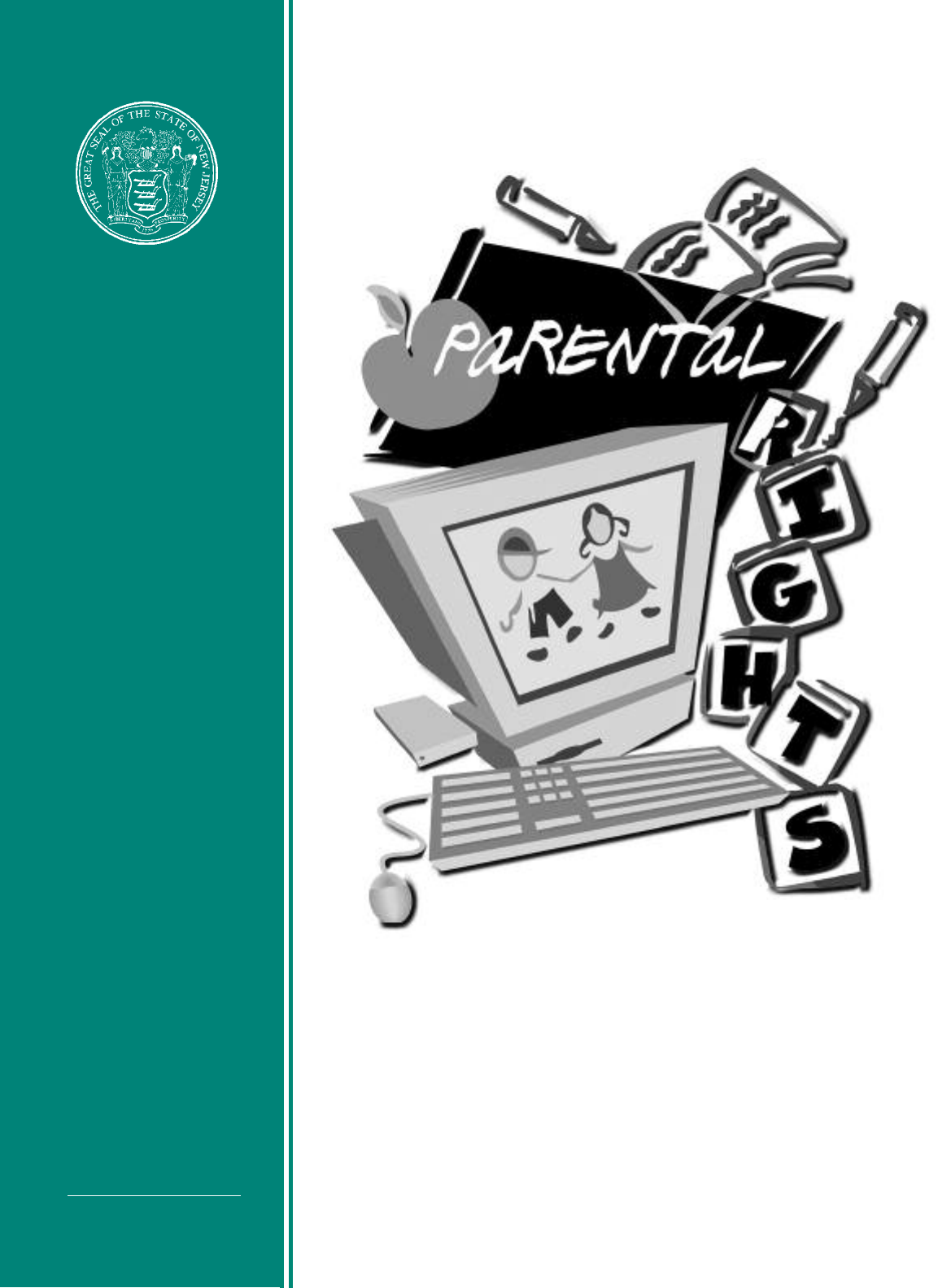
New Jersey Department of Education
Angelica Allen-McMillan, Ed.D.
Acting Commissioner
Kathy Ehling, Esq.
Assistant Commissioner
Division of Educational Services
Kimberly Murray
Director
Office of Special Education
New Jersey Department of
Education
PO
Box 500
Trenton, New Jersey 08625
-
0500
(609) 376-9060
-
www.nj.gov/education/specialed
PTM
1506.13
Parental
Rights
in
Special
Education
RevisedMay 2023

STATE BOARD
OF EDUCATION
Kathy A. Goldenbe
rg. . . . . . . . . . . . . . . . . . . . . . . . . . . . . Burlington County
President
Andrew J. Mulvihill. . . . . . . . . . . . . . . . . . . . . . . . . . . . . . . . . . Sussex County
Vice President
Mary Beth Berry . . . . . . . . . . . . . . . . . . . . . . . . . . .. . . . . Hunterdon County
Elaine Bobrove. . . . . . . . . . . . . . . . . . . . . . . . . . . . . . . . . . . Camden County
Fatimah Burnam-Watkins
.. . . . . . . . . . . . . . . . . . . . . . . . . . . . . Union County
Ronald K. Butcher
. . . . . . . . . . . . . . . . . .. . . . . . . . . . . . . . Gloucester County
Jack Fornaro
. . . . . . . . . . . . . . . . . . . . . . . . . . . . . . . . . . . . . .
. . . . . . . . . . . . . . . . . . . . . . . . . . . . . . .
. . . . . . . . . . . . . . . . . . . . . . . . . . . .
. . . . . . . . . . . . . . . . . . . . . . . . . . . . . . . . .
. . . . . . . . . . . . .. . . . . . . . . . . . . . . . . . . .
. . . . . . . . . . . . . . . . . . . . . . . . . . . . . . . . . . . . .
Warren County
Mary Elizabeth Gazi Somerset County
Nedd James Johnson, Ed.D Salem County
Arcelio Aponte Middlesex County
Joseph Ricca, Jr., Ed.D Morris County
Sylvia Cioffi Monmouth County
Angelica Allen-McMillan,
Ed.D. Acting Commissioner

New Jersey Department of Education
Parental Rights in
Special Education
New Jersey Administrative code for special education (N.J.A.C. 6A:14) and the federal Individuals with Disabilities
Education Act of 2004 (IDEA 2004) are laws that ensure children with disabilities a free, appropriate education in
the least restrictive environment. An important part of these laws provides parents with the right to participate in
their children’s education.
You and representatives of your school district are team members who are responsible for developing an
appropriate educational program for your child. This document will describe the state and federal laws affecting
the provision of special education to help you understand your rights in the special education process. With this
knowledge, you will be prepared to take an active role in your child’s education.
This document has been developed for you by the Department of Education, Office of Special Education
,
in an effort to provide the most comprehensive and up-to-date information. The document is
periodically revised to reflect changes in the law, provide additional information that would be of use
to you, and to provide the information in a more clear and concise manner.
If you need additional help in understanding your rights, contact information for the Statewide Parent Advocacy
Network (SPAN), Disability Rights New Jersey (DRNJ), the County Offices of the New Jersey Department of
Education and your local school district is listed on page 42.
This is the procedural safeguards statement required in accordance with New Jersey Administrative Code
(N.J.A.C.) 6A:14-2.3(g)7.

Request for Expedited Due Process Hearing
Request for Emergent Relief
Request in Lieu of Affidavit or Notarized Statement
Request for Enforcement of a Mediation Agreement
TABLE OF CONTENTS
Referral ................................................................................................................1
Decision-Making and Participation in Meetings
................................................1
Notice of Meeting ...............................................................................................2
Written Notice
....................................................................................................3
Native Language and Written Notice
.................................................................4
Consent ...............................................................................................................4
Parental Requests ...............................................................................................6
Use of Insurance .................................................................................................7
Evaluation ...........................................................................................................7
Independent Evaluation......................................................................................8
Eligibility ...........................................................................................................10
Individualized Education Program (IEP) ...........................................................10
Transition to Adult Life .....................................................................................11
Reevaluation......................................................................................................12
Transfer of Rights Upon Reaching Age of
Majority
..........................................12
Adult Out-of-State Placements .........................................................................12
Confidentiality and Access to
Educational Records
.........................................13
Surrogate Parent................................................................................................14
Placing Your
Child in A Nonpublic (Private) School -
Due to Disagreement
.......................................................................................15
Placing Your
Child in A Nonpublic (Private) School -
Due to Preference (Equitable Participation Services)
....................................15
Resolving Disagreements ..................................................................................16
Voluntary Mediation ........................................................................................16
Due Process Hearings
.......................................................................................18
Expedited Due Process
Hearings
......................................................................21
Application for Emergent
Relief
........................................................................21
Due Process Hearing
Rights
...............................................................................22
Attorney Fees .....................................................................................................23
State Complaint Resolution ...............................................................................25
Disciplinary Procedures......................................................................................34
Commonly Used
Terms
.....................................................................................38
Resources ..........................................................................................................39
Resources for Transition to Adult Life
..............................................................39
Dispute Resolution Forms
Request for Mediation
Request for Due Process Hearing
Request for Enforcement of a Decision Issued by the Office of
Administrative Law
Request for Complaint Investigation

New Jersey Department of Education
Parental Rights in
Special Education
REFERRAL
What is a referral?
A referral is a written request for an evaluation that is given to the school district when a child is
suspected of having a disability and might need special education services.
Who can make a referral?
■ Parents
■ School personnel
■ Agencies concerned with the welfare of students, including the New Jersey Department of
Education
If you believe that your child may have a disability, you may refer your child for an evaluation by
submitting a written request to your school district
1
.
What happens when a referral is made?
Within 20 calendar days
2
of receiving a referral, the school district must hold a meeting to
decide whether an evaluation will be conducted. If an evaluation will be conducted, another
decision is made about the types of testing and other procedures that will be used to determine if
your child needs special education services. If an evaluation will not be conducted, recom-
mendations may be made with respect to interventions or services to be provided the student in
general education.
DECISION-MAKING AND PARTICIPATION IN MEETINGS
How are decisions made about my child’s special education needs?
Decisions regarding your child’s special education needs are made at meetings. As the parent of a
child who has or may have a disability, you have the right to participate in meetings regarding:
■ Identification (decision to evaluate);
■ Evaluation (nature and scope of assessment procedures);
■ Classification (determination of whether your child is eligible for special education and
related services);
■ Development and review of your child’s individualized education program (IEP);
■ Educational placement of your child; and
■ Reevaluation of your child.
You are considered a member of the multi-disciplinary team of qualified persons who meet to
make these determinations and develop your child’s individualized education program (IEP).
1
When writing to the school district about special education issues, you may write to the school principal, director of
special education, child study team supervisor, case manager or other appropriate school official.
2.
This time frame excludes school holidays, but does not exclude summer vacation.
1
1

You have the right to:
■ Have an interpreter, translator or sign language interpreter provided by the school at no cost
to you, when necessary;
■ Participate in required meetings through other means such as individual or conference tele-
phone calls or video-conferencing if you cannot attend in person; and
■ Receive a copy of the evaluation report(s), documentation and information that will be used
for a determination of eligibility not less than 10 calendar days prior to the eligibility meeting.
Must all members of the IEP team attend IEP team meetings?
All required members of the IEP team must attend all meetings of the IEP team unless you
provide written consent to excuse a required member of the IEP team. There are two
circumstances when a school district may request your consent to excuse a member
of the IEP team from a meeting:
■ If a required IEP team member’s area is not being discussed
3
, the school district may ask for your
written consent to have that member of the team excused from part of the meeting or from the
entire meeting. The request for consent must be sent with the notice of the meeting. If you
agree that the team member may be excused, you must sign the request for consent and return
it to the school. As with all requests for consent, you may decline to provide consent and the
team member must then attend the meeting.
■ If a required IEP team member’s area is being discussed, the school district may ask for your
written consent to have that member excused from part of the meeting or from the entire
meeting. The request for consent must be sent with the notice of the meeting and must include
written input from the team member. The written input must also be sent to the other members
of the IEP team prior to the meeting. If you agree that the team member may be excused, you
must sign the request for consent and return it to the school. As with all requests for consent,
you may decline to provide consent and the team member must then attend the meeting.
NOTICE OF A MEETING
How will I be invited to participate in meetings?
To assure that you have the opportunity to participate in meetings and the decision-
making process for your child, meetings about special education for your child must be
scheduled at a time and place agreeable to you and the district. The school district must
notify you in writing early enough to ensure that you will have an opportunity to attend.
What information must be included in the notice of a meeting?
The written notice of the meeting must state the purpose, time, location and who will be
attending and:
■ Inform you that you or the school district may invite to the meeting other individuals who
have knowledge or special expertise regarding your child, including related services
personnel. The determination of whether the individual has such knowledge or special
expertise is determined by the party (you or the school district) who invited the individual;
■ Beginning at age 14, or younger, if appropriate, the notice for a student with a disability
must also indicate that the purpose of a meeting is the consideration of needed transition
services and that the school will invite the student to attend the meeting.
3
For example, if the purpose of an IEP team meeting is to discuss changes to a related service such as speech-language
therapy, the school district may ask to excuse the general education teacher or special education teacher because there is not
change to the classroom instruction and therefore, the teacher's area will not be discussed.
2

May the school district hold a meeting if I am unable to attend?
Yes. The school district may hold a meeting without you. The school district may do so if it is
able to document that it made multiple attempts to schedule a meeting with you or obtain
your participation in the meeting through telephone or video-conferencing and was unable to
do so.
WRITTEN NOTICE
How will I be informed of decisions regarding my child’s special
education needs?
Your school district will inform you of decisions being made about your child by giving you
written notice.
Written notice must be given when the school district:
■ Proposes to start or change:
❥ The identification, evaluation, and classification;
❥ The implementation of an IEP or educational placement;
❥ The provision of a free, appropriate public education (FAPE) to your child;
❥ A reevaluation;
■ Asks for consent; and
■ Approves or denies a request you have made in writing about the identification,
evaluation, educational placement or provision of a free, appropriate public
education to your child.
What must be included in written notice?
Written notice must include a full description of the district’s proposal and a statement that
you have rights under special education law. If the district decides to conduct or not to conduct
an initial evaluation, in addition to everything listed below, the district must give you a copy
of the special education rules and the due process hearing rules.
When providing written notice, the school district must always:
■ Describe the action it is proposing or refusing;
■ Explain why it is or is not taking the action;
■ Describe other options considered and explain why those options were rejected;
■ Describe as applicable, the procedures, tests, records or reports used by the district to make
the decision;
■ Describe any other factors relevant to the district’s proposal or refusal; and
■ Include notice that you have rights under special education law.
When must I be provided a copy of this booklet?
You must be given a copy of this booklet one time per year and whenever:
■ A parent requests a copy;
■ Your child is referred for an initial evaluation;
■ The first request for a due process hearing or first request for a complaint is
submitted to the Department of Education in a school year; and
■ The decision to take a disciplinary action is made that constitutes a change of
placement.
3

All other times, the district must give you a statement explaining:
■ That as a parent of a student who is or may be eligible for special education services,
you have rights under special education law;
■ How you can obtain a copy of the procedural safeguards statement
(PRISE); and
■ Sources you may contact for assistance in understanding the special education rules.
Electronic Mail
If your school district offers parents the option to receive notices via e-mail, you may opt to
receive the following notices electronically:
■ Written notice;
■ Procedural safeguards notice; and
■ Notices related to a due process complaint.
NATIVE LANGUAGE AND WRITTEN NOTICE
Written notice must be in language understandable to the general public and in your
native language or other principal mode of communication. If this is not a written
language, the school must take steps to ensure that the notice is translated orally or by
other means into your native language or other mode of communication. If your language
is not a written language, the school district must assure that you understand the notice,
and it must document that you understand the notice.
4
When must the district provide me with written notice?
Within 15 calendar days of a meeting regarding identification, evaluation or reevaluation,
the IEP, or placement, the school district must give you written notice of any decisions
that were made and/or any actions that were proposed or denied. Written notice must
also be provided when the school district seeks your consent for a proposed action. The
proposed action may be implemented sooner, if the parent agrees in writing.
CONSENT
What does consent mean?
Consent means that you have been given all the information necessary to make an
informed decision about the proposed activity. Consent also means that you understand
and agree in writing to the proposed activity. Therefore, written notice must be part of any
request for your written consent.
Consent is immediate. This means, after you have given your written consent, the school
district must start the activity as soon as possible.
4
This requirement includes providing a sign language interpreter when appropriate.
4

5
5
When must the school district obtain my consent?
Your consent is required:
■ Before your child is evaluated for the first time to determine whether your child is
eligible for special education;
■ Before your child’s special education program starts for the first time;
■ Before your child is tested as part of a reevaluation. However, if the district can show
that it tried to get your consent for the reevaluation of your child and you did not respond,
then the district may proceed to evaluate without your consent;
■ Before your child’s records are released to a person or organization that is not otherwise
authorized to see them;
■ Each time your school district wants to access private insurance covering your child;
■ The first time your school district wants to access public benefits or insurance covering
your child;
■ Whenever your school district wants to excuse a required team member from a meeting
of the IEP team;
■ Whenever your child’s IEP is amended without a meeting of the IEP team; and
■ Whenever you agree to waive a reevaluation of your child.
What happens if I do not give consent for the proposed activity?
If you disagree with the proposed initial evaluation, reevaluation, or release of records and will
not give consent, the school district cannot proceed. If the school district wants to proceed
with any of these proposed activities, the school district must ask for a due process hearing (see
page 17) to obtain consent from an administrative law judge (ALJ). At the due process hearing,
the ALJ will decide if your child can be evaluated, reevaluated or if your child’s records can be
released without your consent.
If you do not agree with a proposal to implement the initial IEP, access public insurance
(such as Medicaid) or your private insurance covering your child, a request to excuse a
required IEP team member from a meeting, a request to amend your child’s IEP without a
meeting, or a request by your school district to waive the (three year) reevaluation of your child,
the school district may not do what it is requesting. If you do not consent, the school
district may not file for a due process hearing to ask an ALJ to provide consent for any of these
types of requests.
Can I withdraw my consent after it has been given?
Giving consent is voluntary. You can revoke (withdraw) your consent at any time by
writing to the school district. Revoking consent does not negate an action that has
occurred after the consent was given and before the consent was revoked. If you write to the
school district to revoke your consent after your child has received special education and/or
related serves, the school district has 10 days to respond to your written withdrawal
with notice. The school district must accept your written revocation of consent and cannot
utilize mediation or a due process hearing to seek to overturn your written revocation of
consent.
The school district may decide to meet with you to discuss the revocation of consent. The
meeting must be held within the 20-day time period to respond to the written revocation of
consent and the school district must send you notice by the 20th day after you provide
the school district your written revocation of consent. Once written notice is sent to you,
you have 15 days to consider the written notice and withdraw the written revocation
of consent if you choose. After the 15 day time periods ends, your child will be
considered a general education student for all purposes, including disciplinary
matters, from that date forward.

If you later determine you would like to have your child receive special education and related
services, you must make a written request for an evaluation of your child. Services may not be
immediately reinstated. Instead, an initial evaluation of your child must be completed and, if
your child is determined eligible for special education and related services after that evaluation is
completed, an individualized education program (IEP) will be developed for him or her.
Special education and related services cannot be provided to your child until a new IEP is completed
“and agreed to by you,” and notice is provided to you.
Can I withdraw my consent for part of my child’s program?
No. When you revoke consent, it is for all special education and related services. You may not revoke
consent only for those services you do not wish your child to receive. If you have a disagreement
with your district over specific services or the placement where the services are being
provided, you should seek a meeting with the IEP team to discuss the services. If you and the
other members of the team do not agree when you meet, you may use the dispute resolution procedures
described later in this booklet to resolve the dispute.
If a parent revokes consent for special education and related services, is
the district required to amend the student’s record because consent has
been revoked?
No. A parent may request that the school district amend the student’s record to remove refer-
ences to the provision of special education and related services if the parent revokes consent after
the student has been initially provided special education and related services. However, the school
district is not required to remove any references to the receipt of special education and related
services because the consent has been revoked.
Must the school district obtain my consent each time there is a proposal
to change my child’s program or placement?
No. Once services have started, you or the school district may propose changes to your
child’s program or placement at an IEP meeting. Your consent is not required to implement the
changes. The school district must provide you with written notice of the proposed changes as
described above.
How can I stop the proposed action when I disagree?
You must request mediation or a due process hearing after receipt of the written
notice (see Native Language and Written Notice sections). To request mediation or a due
process hearing, you must put your request in writing and send it to the Department
of Education and the school district. A mediation/due process hearing request form is included at the
end of this booklet. While the disagreement is being resolved, your child’s current
placement and services will remain the same. This is called “stay-put.”
If you disagree with the proposed action and you do not inform the school district of your disagreement by
requesting mediation or a due process hearing, the proposed action may be implemented.
PARENTAL REQUESTS
You may request a change in the evaluation, eligibility, IEP or placement of your child.
Whenever you make such a request of the school, you should make the request in writing
and keep a copy for your records. The school has 20 calendar days to answer you in
writing. School holidays are not counted in the 20 days. But, schools are required to
respond within 20 days during the summer. The answer must include the components of
notice (see page 3). In addition, if a meeting is necessary to respond to your request, the
meeting must be held within 20 days of the request. If your school district adopts a policy
permitting parents to submit written requests by electronic mail, you may submit your
requests by following the school’s e-mail policy. Otherwise, such requests must be
written or typed and provided to the school district.
6

USE OF INSURANCE
May the school district require that I utilize my private medical insurance or
public insurance or benefits covering my child to obtain evaluations of my child,
or special education or related services required to provide my child a free,
appropriate public education (FAPE)?
No. The school
district
may
not require
you to consent
to using
public
or
private
insurance
covering
your child to obtain
an
evaluation
of your
child, or to provide
special
education
or
related
services
(e.g. physical therapy,
speech-language
services)
that your
child
needs
to receive
a FAPE.
However,
if
your school district
provides
written
notice
and
you
consent,
public
or
private insurance
or
benefits
may be used. The
district
must
inform
you that
providing
consent
is voluntary.
Also,
your
consent
must be requested and
obtained
by the
school
district
every time
it
uses private
insurance
covering
your child to
obtain special
education
or related
services
for
your child,
and
in
accordance
with
federal regulations,
the first
time
the
school
district
seeks
to use
public
insurance
or
benefits
covering your child.
This
means,
for example,
if
the
school
district
asks
to use
your
insurance
to
provide physical
therapy
for your
child
one time
a
week
for the
school
year covered
by your
child’s
IEP, your consent
must
be
provided
at
the beginning
of
the
school
year
to
use your
insurance
to
provide the physical
therapy
for the
year.
If the school
district
later
wants
to use your
insurance
to
provide another service, it must again ask for your consent before it may use your insurance.
5
Can my district access my Medicaid benefits?
Your school district may access your Medicaid benefits to receive money through the Special
Education Medicaid Initiative (SEMI) program. A school district may access Medicaid benefits only if
a consent form is signed by the parent. Signing the consent form will have no effect on your child’s
Medicaid health coverage. The district is also required to send a reminder to parents once per year
which describes the SEMI program.
EVALUATION
What is an evaluation?
An evaluation is the process used to determine whether your child has a disability. This process
includes a review of any relevant data, and the individual administration of any tests, assessments
and observations of your child. For an initial evaluation, at least two child study team members
6
and
other specialists,
7
as required or as determined necessary, must participate. A minimum of two
assessments of your child are needed to determine eligibility for special education and related
services. Each assessment must be conducted by a person who has appropriate training, or who is
qualified to conduct the assessment through his or her professional license or certification.
When is an evaluation needed?
An evaluation is needed when you, the members of the child study team, and your child’s
teacher meet and decide that your child may have a disability.
5
If you do not consent to use your insurance, the district must still provide the service(s) at no cost to you.
6
When the suspected disability is a language disorder, the speech-language specialist may participate as one
of the two required child study team members.
7
Specialists include but are not limited to, speech-language specialists, occupational therapists, physical ther-
apists, and physicians.
7

May evaluations/assessments of my child that have been prepared by someone that does
not work for the school district be used as one of the two assessments required for an initial
evaluation of my child?
Yes. Reports and assessments prepared by child study teams or persons who provide related services
(such as physical therapy or speech-language services) may be used as assessments for an initial
evaluation. The assessments and reports must be from persons who work for other public school districts
(or educational services or jointure commissions), clinics or agencies approved by the Department of
Education, or professionals in private practice. To be used, the report must have been completed within
the past year and must be reviewed by the child study team member or other person in the district
qualified to review the report. If the district determines that the report meets the requirements in the
State regulations for evaluating students, the report may be used as one of the required assessments of
your child.
INDEPENDENT EVALUATION
What is an independent evaluation?
An independent evaluation is an evaluation by a qualified person who is not employed by your school
district. If you do not agree with the evaluation or reevaluation completed by your school district, you
are entitled to ask for ONE independent evaluation. This means you may decide that the evaluation
by the district was not performed correctly or was incomplete, and that you would like an evaluation
that is done by others.
You may request as many (or as few) separate assessments as you wish when you request your ONE
independent evaluation. For example, you may decide that one or more assessments that your school
district completed, such as the learning assessment or psychological assessment of your child, were
incorrect, and that you would like others to conduct new assessment(s). Or, you may believe that the
school district’s evaluation should have included an assessment(s) that the school district did not do,
such as a medical or behavioral assessment of your child.
Once you make your request for an independent evaluation after the school district completes its
evaluation or reevaluation, the assessment(s) you requested will be completed by other persons
(unless an ALJ says they should not be). After the assessments are completed, you may not ask for
another independent evaluation to be paid for by your school district until the next reevaluation of
your child has been completed by your school district. Therefore, you must be sure to ask for all
assessments you believe are needed as part of your request for an independent evaluation because
you will have to wait for a reevaluation before you may make another request for an independent
evaluation to be paid for by your school district.
What are the requirements for an independent evaluation?
An independent evaluation is provided at no cost to you. It is at public expense. If, as part of a due
process hearing, an ALJ requests an independent evaluation, it, too, must be obtained by the school
district at public expense. Independent evaluations must meet the same requirements as evaluations
conducted by the school district.
What if the school district believes its evaluation is appropriate?
When the school district disagrees with the need for an independent evaluation, the school district must
ask for a due process hearing within 20 days of receipt of your request. If an ALJ decides that the dis-
trict’s evaluation was appropriate, the district will not have to pay for the independent evaluation.
Your right to obtain an independent evaluation at your own expense would not change.
8

Must my school district have assessed my child in the area(s) where I am asking
for an independent evaluation before I am allowed to get an independent
evaluation?
No. A district cannot limit your right to an independent evaluation by first conducting an assessment in
an area not already assessed by the initial evaluation or reevaluation. Upon receiving your request,
the district must provide information on where an independent evaluation can be obtained, or ask for
a due process hearing.
Where can an independent evaluation be obtained?
An independent evaluation may be obtained from another school district, an educational services
commission, a jointure commission, an approved clinic or agency, or a private practitioner, who is
certified and/or licensed as required. Information regarding these resources must be provided to you
by your school.
Can the school district impose limitations or restrictions on the choice of
evaluators?
If the school district agrees to your request for an independent evaluation, the school district must
provide information on where an independent evaluation may be obtained. To assist school districts
and parents, the Department of Education maintains a list of approved clinics and agencies. School
districts may suggest a number of clinics or agencies within the geographic area from that list. Parents
must be able to obtain the requested evaluation from the suggested list within a reasonable time
frame and at the rate determined by the district.
If you do not agree to select a provider from those suggested by the school district, the district must
consider your request for a different provider. Also, the school district must consider your request for
an evaluator that costs more than the school district usually pays for the same evaluation. If the school
district disagrees with your request, it must request a due process hearing to deny your request.
Such consideration and the district’s decision to grant or request a due process hearing to deny the
request must occur within 20 days of receipt of the request for an independent evaluation.
Are there any circumstances that would allow a school district to deny a request
for an independent evaluation without requesting a due process hearing?
Yes. A school district may deny a parent’s choice of evaluator without requesting a due process
hearing, if the evaluator does not hold a New Jersey certificate and/or license, where a certificate and/
or license is required. Additionally, parents are entitled to one independent evaluation (which may
include more than one assessment) for each initial evaluation or reevaluation. Thus, after an
independent evaluation has been conducted or an ALJ has decided that an independent will not be
conducted, the school district may deny subsequent requests for an independent evaluation without
requesting a due process hearing. When the district conducts another reevaluation, a parent may seek
an independent evaluation if he or she disagrees with that reevaluation.
What is the school district required to do when it receives an independent
evaluation?
The school district must consider any independent evaluation, including one you pay for, when
making decisions regarding your child’s special education program. However, the school district is not
required to accept the evaluation report or incorporate any of its recommendations in your child’s IEP.
An independent evaluation may be presented as evidence at a due process hearing.
9

ELIGIBILITY
How is eligibility determined?
When the evaluation is completed, eligibility is determined collaboratively at a meeting according to
N.J.A.C. 6A:14-2.3(k)1.
8
To be eligible for special education and related services:
■ A student must have a disability according to one of the eligibility categories;
■ The disability must adversely affect the student’s educational performance; and
■ The student must be in need of special education and related services.
The school district must provide a copy of the evaluation report(s) and documentation to
be used to make a determination of eligibility to the parent (or adult student, when
applicable) not less than 10 days prior to the meeting.
INDIVIDUALIZED EDUCATION PROGRAM (IEP)
What is an individualized education program?
After your child is determined to be eligible for special education and related services, a meeting will
be held to develop your child’s IEP. The IEP is a written plan that describes in detail your child’s special
education program. The IEP should describe how your child currently performs and your child’s specific
instructional needs. The IEP must include detailed and measurable annual goals and short-term
objectives or benchmarks.
Who must attend the IEP meeting?
Except when they have been excused from attending the meeting with your consent in accordance
with the procedure on page 2, the following persons must attend IEP meetings:
■ Student, if appropriate
9
;
■ Parent;
■ Not less than one general education teacher (to the extent appropriate), if the student is or will
be participating in regular education;
■ Not less than one special education teacher (or special education provider where appropriate);
■ At least one child study team member;
■ Case manager;
■ School district representative;
■ Others at the discretion of the parent or school district; and
■ If transition will be discussed at the IEP meeting, a representative of any other agency likely to
provide or pay for services; and
■ At request of the parent, the Part C Service Coordinator for a student transitioning from the
Early Intervention Program to the Part B Special Education program offered by the school
district.
8
Students with a speech and/or language disorder may be eligible for speech-language services only
as
described in N.J.A.C. 6A:14-3.6.
9
in
Beginning at age 14, the student must be invited to attend the IEP meeting as required to participate
planning for transition to adult life.
10

You have the right to:
■ Copies of your child’s IEP;
■ Bring others with you to the meetings;
■ Tape record IEP meetings if you inform the other persons orally or in writing, prior to the
meeting starting that you intend to record the meeting;
■ Have the IEP implemented within 90 days of the school’s receipt of your consent for the first
evaluation;
■ Have the IEP implemented as soon as possible following an IEP meeting;
■ Have the IEP reviewed at least annually; and
■ Have extended school year services considered by the IEP team.
TRANSITION TO ADULT LIFE
What is transition planning?
Transition planning is a formal, long-range cooperative process that will assist your child to suc-
cessfully move from school into the adult world. New Jersey regulations require that transition
planning begins to be addressed in the IEP that will be in place for the school year in which your
child reaches 14 years of age, or younger if determined appropriate by the IEP team.
Transition planning continues to be addressed in your child’s IEP each year until graduation or exit
from high school.
Who is involved in transition planning?
Transition planning typically involves the IEP team, other family members, school staff, staff from
other agencies, employers and other community members. Whenever transition planning will be
included in the IEP, the student
must
be invited to attend the IEP meeting and become an inte-
gral member of the IEP team.
What are the components of transition planning?
The following are key components of transition planning in the IEP for children turning 14 and
older:
● A statement of the child’s strengths, interests and preferences
● Identification of a course of study (course titles for the duration of the IEP and beyond)
● Identification of strategies and/or activities that are intended to assist the child in
developing or attaining postsecondary goals
● A description of the need for consultation (information and/or advise) from other
agencies (such as the Division of Vocational Rehabilitation Services, Children’s System
of Care, Division of Developmental Disabilities, etc.)
● A statement of any needed interagency linkages and responsibilities
Additional key components are included as part of transition planning in the IEP for
children turning 16 and older:
● The child’s postsecondary goals based upon age-appropriate transition assessments
related to training, education, employment and, if appropriate, independent living
● The transition services needed to assist the child in reaching those postsecondary
goals (a coordinated set of activities/strategies that includes instruction, related
services, community experiences, the development of employment and other post-
school adult living objectives, and, when appropriate, acquisition of daily living skills
and functional vocational evaluation)
For additional information on transition planning, see the Resources section of this document.
11

REEVALUATION
How often must my child be reevaluated?
Your child must be reevaluated within three years of his or her last evaluation unless you provide
consent to waive the three-year reevaluation. If you provide consent to waive the three-year
reevaluation, the next three-year time period for reevaluation begins on the date you provide
your written consent to waive the reevaluation. A reevaluation may be conducted sooner than
three years if conditions warrant it or if you or your child’s teacher requests it. However, a school
district may deny your request for a reevaluation that is made within one year of the date the
last evaluation of your child was completed. In addition, the school district must reevaluate your
child before it may determine that your child is no longer a child with a disability and no longer
eligible for special education and related services.
What are the requirements for a reevaluation?
The IEP team must meet to review the current data and decide whether additional testing is
required to determine if your child’s eligibility for special education and related services should be
continued. The IEP team may decide that no additional information is needed to determine your
child’s continuing eligibility for special education. As a member of the team, you may disagree
with the decision and you may request that the school district conduct an assessment of your
child. Then, the school district must assess your child to determine eligibility (or ineligibility).
Does the school district need my consent to conduct testing as part of a
reevaluation?
The school must obtain your consent before conducting any testing as part of a reevaluation of
your child. However, if the school can show that it tried to get your consent for the reevaluation of
your child and you did not respond, then the school may proceed with the testing as planned.
TRANSFER OF RIGHTS UPON REACHING AGE OF MAJORITY
What rights do I have when my child reaches age 18?
When your child reaches age 18, all rights under special education law will transfer to your child
unless a court has appointed a legal guardian for your child. Both you and your adult student will
receive all the required notices contained within these parental rights. At least three years
before your child turns age 18, the school district must inform both you and your child of the
transfer of these rights.
ADULT OUT-OF-STATE PLACEMENTS
What should parents consider when students attending out-of-state
placements turn age 21?
When discussing
the
possibility
of a
placement
out-of-state,
parents
should
bear in mind
that
any
student with a developmental
disability
who
is placed
in an out-of-state
educational
facility
after
January 11, 201
6 will not be able to access any funding for out-of-state services from the New
Jersey Division of Developmental Disabilities once the student reaches the age of twenty-one (21).
12

CONFIDENTIALITY AND ACCESS TO EDUCATIONAL RECORDS
10
May I see my child’s educational records?
School districts must maintain the confidentiality of information in your child’s
educational record. However, the public school maintaining your child’s educational records
must assume you have authority to inspect/review your child’s records unless the school has
been legally notified in writing that your rights have been terminated under state law, such as
through guardianship or divorce.
You have the right to:
■ Ask to see a list of all the types of records kept regarding your child and where the records
are kept;
■ Look at any of your child’s educational records which are kept or used by the school district:
❥ Without unnecessary delay;
❥ Before any IEP meeting or hearing; and
❥ Within 10 days after asking to see the records.
(If possible, this request should be in writing.)
■ Ask for an explanation and interpretation of the records;
■ Obtain copies of the records. A school may charge a reasonable fee for copying if that fee
does not prevent you from reviewing the records. The school may not charge a fee to
search for or retrieve the records;
■ Be notified before information in your child’s records is destroyed; and
■ Give consent or refuse to give consent to share your child’s records with anyone who does
not have an educational or legal purpose in seeing them.
The school must keep a record of those obtaining access to your child’s record, including names,
dates and purposes for the access. If you ask, you have a right to be told who has been given
information from your child’s records, the date it was given and how it was used.
The school district must obtain your written consent before any personally identifiable informa-
tion about your child may be released to any person not otherwise entitled by law to have
access to it (see page 5).
If you give the school written consent, you can have someone else receive and/or review the
records for you. If a record has information on more than one child, you may look at the infor-
mation about your child only.
Do I have a right to review my child’s records when he/she becomes an
adult student?
Until your child reaches age 18, you have access to all educational records maintained by the
school. After the transfer of rights upon reaching the age of majority, you have the right to
access your child’s educational records only if your child is still financially dependent on you and
is still enrolled in the public school system, or if you have your adult child’s consent for access.
How do I get my child’s records changed?
You may ask the school district to change your child’s educational records if you believe the
records:
■ Are irrelevant;
■ Are inaccurate;
■ Do not protect privacy or other rights of your child; or
■ Are otherwise improper.
10
The regulations for student records are found at N.J.A.C. 6A:32. The school district is required to give
you a copy of these regulations when you ask.
13

If you ask the school district to change your child’s record, you have a right to receive a decision
about your request. The school district may decide to make the change and inform you of the
change in writing; otherwise, the school district must meet with you within 10 days to determine
whether the change will be made.
If the school district will not make the change, it must inform you of the refusal and your right to
appeal by requesting a hearing from the Commissioner of Education pursuant to N.J.A.C. 6A:3.
If the Commissioner decides after a hearing that the records do not need to be changed, the school
district must notify you in writing of your right to add a statement to your child’s records giving the
reasons you do not agree with the school’s records. This statement must be maintained in your
child’s records as long as the relevant record is maintained, and the statement must be released
whenever the relevant record is disclosed.
11
SURROGATE PARENT
When is a surrogate parent appointed and what is the surrogate parent’s role?
When the student’s parent cannot be identified or the parent cannot be located after reasonable
efforts, when an agency of the state has guardianship of the student, when the student is a ward of
the state, or when the student is an unaccompanied homeless youth as defined in federal law, a
surrogate parent must be appointed for the student. The surrogate parent represents the student
in all matters relating to identification, evaluation, development of the IEP, placement of the
student, and provision of a free, appropriate public education (FAPE) to the student.
The responsible school district must have in place a method for determining whether a child
requires a surrogate parent and for assigning a surrogate parent to a child when necessary. In
addition, the school district must make reasonable efforts to appoint a surrogate parent within 30
days of determining that a surrogate parent is needed for a student. The responsible school district
must ensure that each surrogate parent meets the following criteria:
■ The person must have no interest that conflicts with those of the student he or she represents;
■ The person must possess knowledge and skills that ensure adequate representation of the
student;
■ The person must be at least 18 years of age; and
■ The person cannot be an employee of the school district, the New Jersey Department of
Education or any other agency involved in the education or care of the child. (If the school dis-
trict compensates the surrogate parent solely for serving in that capacity, the person is not
considered an employee of the school district.)
Finally, a school district may not replace a surrogate parent without cause and, if the school district
compensates a surrogate parent for serving as a surrogate parent, the person must undergo a
criminal history check in accordance with N.J.S.A. 18A:6-7.1.
11
According to student records code, N.J.A.C. 6A:32-7.4(e), mandated student records shall be main-
tained for a period of five years after graduation, termination from the school district, or age 23,
whichever is longer.
14

PLACING YOUR CHILD IN A NONPUBLIC (PRIVATE) SCHOOL –
DUE TO DISAGREEMENT
If I disagree with the school district’s program and I place my child in a nonpublic
(private) school, who is responsible to pay for the costs?
Your child has the right to a free, appropriate public education. If your child is enrolled in a public
school and you disagree with the school district’s special education program, you may choose to
place your child in a private or a nonpublic school, or a private early childhood program that you
believe meets your child’s special education needs. You are responsible for the costs, unless it can be
proven at a due process hearing that the district failed to provide your child with a free, appropriate
public education and the school you chose is appropriate to meet your child’s educational needs.
What must I do if I plan to ask the school district to reimburse me for the costs of
the non-public (private) school?
If your child has an IEP developed by the school district, you may place your child in a nonpublic
(private) school and seek reimbursement from the district. You must inform the school district at an
IEP meeting and provide the school district with written notice at least 10 days (excluding
weekends only) prior to the enrollment of your child in the nonpublic (private) school. You must state
your disagreement with the school district’s IEP, the placement proposed by the school district and
your intention to enroll your child in a nonpublic (private) school.
If the school district has provided you with written notice of its intent to evaluate your child,
before your removal of your child from the public school, you should make your child available to the
school district for evaluation in order to protect your claim for reimbursement.
Failure to inform the school district of your intention to make a private placement at
public expense, failure to make your child available for evaluation, or other unreasonable action on
your part could result in an ALJ’s decision to reduce or deny reimbursement for the private placement.
PLACING YOUR CHILD IN A NONPUBLIC (PRIVATE) SCHOOL –
DUE TO PREFERENCE (EQUITABLE PARTICIPATION SERVICES)
If I have placed my child in a nonpublic (private) school because I prefer the
type of education offered by the nonpublic school, does my child have a right
to special education and related services from a public school district?
A student with a disability who is enrolled by his or her parents in a nonpublic school does not have an
individual entitlement to receive some or all of the special education and related services that he or
she would receive if enrolled in the public school. However, your child does have a right to be
referred to a child study team for an evaluation for eligibility for special education and related
services.
If your child is a preschool student enrolled in an early childhood program, your school district of
residence is responsible to identify him or her and, if appropriate, evaluate for eligibility for special
education and related services. If your child is found eligible, your school district of residence would
offer a program designed to provide him or her a free, appropriate public education. Such a
program would be provided following enrollment in the public school district and would be provided
in a placement determined by the IEP team. If you decline the program offered by your school district
of residence because you want your child to remain in the early childhood program, you may go to
15

the school district where your child attends the early childhood program (possibly the same district)
and seek a service plan and services. A service plan will be written only if your child will be receiving
services and need not include the level of services that a public school district could offer if your child
were enrolled in the district.
If your child is in a kindergarten through 12th grade program, the child study team of the school
district where your child attends nonpublic school (district of attendance) would determine whether
to evaluate your child. If an evaluation is warranted, the team must conduct assessments at no cost
to you and determine whether your child is eligible for special education and related services. If your
child is determined eligible, a service plan will be written only if your child will be receiving services.
Whatare myrightsif Idisagreewith theevaluationor withthedetermination of
eligibility?
You may request mediation or a due process hearing if the child study team decides an evaluation is
not warranted or if you disagree with the assessment plan. You may request an independent
evaluation at no cost to you if you disagree with the evaluation conducted by the team. You may also
request mediation or a due process hearing if you disagree with the determination of eligibility.
(See the sections on mediation and due process hearing, pages 15 and 17.)
IfmychildisdeterminedeligibleandIdisagreewiththeproposalforservices,
whataremy rights?
You do not have
the
right to
request
mediation
or a due
process
hearing
to disagree
with the
special
education and related
services
that
are proposed
for
your
child in
a service
plan.
This
is so even
when
the district decides not to provide any
services.
12
For disagreements regarding the provision of services by the district where the nonpublic school is
located, you may file a complaint.
OSE will determine whether the district of attendance (the
school district where your child attends the nonpublic school) used the appropriate
procedures in determining which children will receive services and whether the services are being
provided.
RESOLVING DISAGREEMENTS
What happens if I disagree with the school district over the identification,
evaluation, classification, educational placement or the provision of a free,
appropriate public education?
There may be a time when you and the school district disagree. Many disagreements can be resolved by
communication with your child’s teacher, case manager, the school principal, or other school district
personnel. There are also procedures established under state and federal law to address your
concerns, such as complaint resolution, mediation or a due process hearing.
VOLUNTARY MEDIATION
What is mediation?
Mediation is a way to discuss and resolve disagreements between you and the school district with the
help of a trained, impartial third person known as a mediator.
Where and when does mediation occur?
Mediation occurs at a meeting (conference) held by a mediator at a time and place reasonably
convenient to the participants. The meeting will be scheduled within 15 days of receipt of a written
request.
12
If you choose to enroll your child in the public schools and request an IEP, you are permitted to file for
a due process hearing to challenge the program and services in the IEP.
16

Adobe Acrobat Reader is document reader software that is available for free download
.
Please
note
that
requests for an enforcement of a mediation agreement or enforcement of a final decision issued by
the Office of Administrative Law will NOT
be accepted via electronic mail and must be mailed or faxed
to
the OSE to be accepted and processed.
May I bring an advocate or lawyer to the mediation conference?
What happens to my child during mediation?
What happens if an agreement is reached? If an agreement is not reached?
How are mediators selected?
Mediators are not employed by the SEA. They are selected on a rotating basis. When a request for
mediation is received, the next available mediator is assigned to conduct the mediation conference.
Who may ask for mediation?
Either you or the school district may ask for mediation if there is a disagreement.
How much does mediation cost?
Mediation is provided at no cost to you or the school.
How can I request mediation?
Y
ou may submit a written request to:
Director, Office of Special Education
New Jersey
Department
of Education
P.O. Box
500
Trenton,
New
Jersey 08625-0500
The request for
mediation must:
State
the
issue
(problem);
Specify
the
relief
(solution)
sought
;
and
Show
that
a
copy
of
the
request
was
sent
to
the
school
district.
17
A
request
form
that
ma
y
be
use
d
to
ask
for
mediatio
n
is
attached
t
o
the
end
o
f
thi
s
booklet
.
Please
note
that
use
of
the
model
form
is
not
required;
however,
providing
the
requested
infor-mation
will
assist
in
expediting
your
request.
Can a parent file a request for mediation through electronic mail or other
electronic submission?
The OSE accepts
requests
for
mediation,
a
due
process
hearing,
emergent
relief (request
only; attachments must be sent separately via regular mail) electronically through an OSE-
maintained and monitored email address. The email address will be used exclusively for the
submission of requests
and will
not be used
to communicate
with
the parties
or their
representatives.
Completed
petitions
must
be saved as Adobe PDF documents
and
submitted as
an attachment
to
an email
sent
to:
.
You may bring an advocate and/or lawyer with you to help you in the mediation conference. The
school district may
also bring
a
lawyer
to the
mediation conference even if you do not.
From the time a proper
request
for mediation
is
received
until
the
mediation
is completed,
your
child’s
classification,
program
or
placement
cannot be changed unless you agree with the school to
make the change or emergent relief (see page 20) is requested by you or the district and granted by an
ALJ.
If you and the school district reach an agreement, it will be written by the mediator and signed by both
you and the school district. If discussions during mediation do not result in a written agreement,
then only the date and the names of persons at the mediation will be recorded. Mediation
discussions are confidential and may not be used as evidence in a hearing. Mediation
conferences may not be tape-recorded.

Give the name and age of the child;
Give the child’s address;
Identify the school
the child
is attending;
Describe the problem
and
facts
relating to
the
problem;
Propose a solution
to the
problem;
and
Show that a copy of the request was sent to the
school district.
18
What happens if the parties need more time to complete the mediation?
If both parties agree that more time is needed to obtain additional information or explore
options, the mediator and parties may extend the mediation for an appropriate period of time.
What happens if the school district fails to comply with a mediated agreement?
If you believe that the school district has not implemented the mediated agreement as written, you
may request enforcement of the agreement by completing the appropriate form and submitting
it to the Director of the Office of Special Education at the address listed above or by
seeking enforcement in court. A form that may be used to request enforcement of the mediation
agreement is attached to the end of this booklet.
What may happen if I do not want to mediate?
Mediation is voluntary and may not be used to delay or deny your right to a due process hearing.
However, the school district may establish procedures that require you to speak with a state
mediator to discuss the benefits of mediation, if you choose not to use the mediation process.
DUE PROCESS HEARINGS
What is a due process hearing?
A due process hearing is a legal process in which the resolution of a disagreement between you and
the school district is decided by an administrative law judge (ALJ) from the Office of
Administrative Law (OAL).
Who may ask for a due process hearing?
Either you or the school district may ask for an impartial due process hearing if there is a dis-
agreement over the identification, evaluation, program, placement or provision of a free, appro-
priate public education to your child.
How can I request a due process hearing?
You may submit a written request to:
The request for Due Pr
ocess must:
Director
Office of
Special
Education
New Jersey Department
of
Education P.O. Box
500
Trenton, New
Jersey
08625-0500
Or you may email your request to:
In the case of a homeless child,
available contact information for the child and
the name of the school the child is attending.
A form that may be used to request a due process hearing is attached to the end of this
booklet. Failure to provide the information listed above may result in: (1) dismissal of your
request because it is insufficient, (2) a delay in the proceedings, or (3) a reduction of the
award of any attorney fees to which you may be entitled if you win your case. Please note
that use of the model form is not required; however, providing the requested information
will assist in expediting your request.

Can a parent file a request for due process through electronic mail or other
electronic submissions?
The OSE accepts requests for mediation, a due process hearing, emergent relief
(request only; attachments must be sent separately via regular mail) electronically through an OSE-
maintained and monitored email address. The email address will be used exclusively for the submission
of requests and will not be used to communicate with the parties or their representatives. Completed
petitions must be saved as Adobe PDF documents and submitted as an attachment to an email sent
to: [email protected].
Adobe Acrobat Reader is document reader software that is available for free download. Please note
that requests for a enforcement of an mediation agreement or enforcement of a final decision issued
by the Office of Administrative Law will NOT be accepted via electronic mail and must be mailed or
faxed to OSE to be accepted and processed.
May I request mediation and a due process hearing at the same time?
Yes. Either you or the school district may request mediation as part of a request for a due
process hearing.
When must I file my request for a due process hearing?
You must file your request for a due process hearing within two years of the date you knew or should have
known of the action of the school district you are challenging. The time period will only be increased if
you demonstrate to an ALJ that the school district made you believe the matter has been resolved to
your satisfaction, or if the school district withheld information from you that it was required by law to
provide to you.
What happens when I request a due process hearing?
Within 15 days of receipt of the request for a due process hearing, you and the school district (the parties)
must participate in a resolution meeting arranged and conducted by the district. In place of the resolution
meeting, the parties may agree to mediation conducted by OSE, or the parties may agree in writing to
waive the resolution meeting. If the parties are participating in a resolution meeting, the district will
arrange this meeting. If the parties have agreed to mediation, a representative from the district
must contact OSE to facilitate the scheduling of the mediation conference, at which time OSE
staff will obtain available dates from the parties and arrange the mediation conference. The
resolution period, during which a resolution meeting or mediation is held, lasts for 30
days, after which the matter may be transmitted to the OAL for a due process hearing if the parties have
not resolved the dispute.
In addition to participating in mediation or a resolution meeting, the school district must file the necessary
response to your request for a due process hearing within 10 days of receiving the request.
What happens if the school district fails to schedule the resolution meeting
within 15 days?
If the school district does not schedule a resolution meeting within the required timeline and you and the
school district are not participating in mediation and have not waived the resolution meeting,
you may file a request with OSE at the address listed above to ask an ALJ to schedule your
case for a due process hearing and begin the 45-day timeline. The ALJ will decide whether the
school district had a good reason for not scheduling a resolution meeting. If the ALJ determines the school
district did not have a good reason for failing to schedule the resolution meeting, the ALJ may order the
due process hearing to begin. If the ALJ decides that the school district had a good reason for not
scheduling the resolution meeting, the ALJ may order that the resolution meeting or a mediation
conference be held within a specific time period before the case goes to a due process hearing.
19

What happens if I choose not to attend, or I fail to attend, the resolution
meeting with the school district?
If you fail to attend a resolution meeting with the school district and you and the school district are not
participating in mediation and have not waived the resolution meeting, the school district may file a
request to have your request for a due process hearing dismissed by an ALJ. If the ALJ determines that
you did not have a valid reason for not attending the resolution meeting, the ALJ may dismiss your
request for a due process hearing. If the ALJ determines that you did have a valid reason for not
attending the resolution meeting, the ALJ may order the resolution meeting or a mediation conference
be held within a specific time period before the case goes to a due process hearing.
If the ALJ dismisses your case, you may file a new request for a due process hearing. All requirements for
resolution prior to the start of the due process hearing will begin again.
May the school district challenge my request for a due process hearing?
If the school district believes you failed to meet the requirements for a sufficient request listed on page
17, it may challenge the sufficiency of your petition. If an ALJ agrees that your petition is insufficient, the
ALJ may either permit you to amend your request or dismiss the request. If amendment is
permitted, you must amend your petition as directed by the ALJ. If the request is dismissed, you may
correct the deficiencies and file a new request for a due process hearing.
May I amend my request for a due process hearing after it has been filed with OSE?
Yes. However, you may amend your request for a due process hearing only with the consent of
the school district or if you request and receive permission from the ALJ hearing your case. If you do
not receive consent from the school district or an ALJ, your request may not be amended.
What happens if the school district requests a due process hearing?
If your school district requests a due process hearing with respect to an issue concerning your
child, you and the school district may agree to mediate the dispute. If so, the matter will be
scheduled for mediation and the mediation conference will be held prior to the case being sent to the
OAL for a due process hearing (if the matter is not resolved at the mediation conference). If either
you or the school district does not wish to mediate the matter, it will be immediately sent for a due
process hearing, as there is no requirement for a resolution period as there is with a request by a
parent for a due process hearing.
How long does it take for the case to be decided?
After resolution activities have occurred and the case has been transmitted to the OAL, the due process
hearing must be completed, and a copy of the decision mailed to you and the school district within 45
days, unless specific extensions of time have been granted by the ALJ.
If I disagree with a determination of my child’s IEP team to change his eligibility
status,
classification, program or placement, and I file a request for mediation
and/or a due process hearing, what happens to my child while the case is being
decided?
If you file your request for a due process hearing after receiving the written notice from the district,
the proposed action cannot take place and no changes may be made to your child’s
classification, program or placement. Your child would remain in his or her current placement until
your mediation and/or due process hearing are resolved either by agreement of the parties,
withdrawal of the request by you, or issuance of a final decision by the ALJ.
20

If your request for a due process hearing involves one or more issues regarding your child's current
educational placement for the purposes of "stay-put," it is appropriate for an ALJ to make an initial
determination regarding the placement pending the final decision in a due process hearing.
What happens if the school district does not comply with the decision of an
ALJ in a due processhearing?
You have the right to either go to court to seek an order that the school district comply with the
decision of the ALJ, or you may submit a written request to the Director of OSE at the
address listed above and seek enforcement of the decision of the ALJ. You must make your
request within 90 days of when the school district was to complete the action you assert did not
occur, and your request must include a copy of the decision of the Office of Administrative
Law. The school district may then respond to the request and seek to resolve the disagreement with
you. If the matter is not resolved, OSE will determine whether the school district failed to comply
with the decision of the ALJ and, if it is determined that the school district did not do so, OSE will
direct the school district to comply. However, if you and the school district agree to modify the
ALJ’s decision after it is issued, you may not seek enforcement of that part of the ALJ’s decision
that you modified. A form that may be used to request enforcement of the due process
decision is attached to the end of this booklet.
EXPEDITED DUE PROCESS HEARINGS
What is an expedited due process hearing?
An expedited due process hearing is a hearing before an ALJ on disciplinary matters. For example, if
you disagree with the determination of the IEP team that your child’s behavior was not a
manifestation of his disability, you may request an expedited hearing. If the school district believes it
is dangerous for your child to remain in his or her current placement and you and the district cannot
agree to an appropriate placement, the district must request an expedited hearing to remove
your child.
What is the difference between an expedited due process hearing and other
due process hearings?
An expedited due process hearing must be held within 20 school days of the request for a due
process hearing, and the decision of the ALJ must be issued within 10 school days of the hearing. In
addition, the resolution period for an expedited due process hearing is 15 days, and the mediation or
resolution meeting should be held within 7 days of the request for the due process hearing.
Is mediation available as part of an expedited hearing?
Yes. Mediation is available.
APPLICATION FOR EMERGENT RELIEF
What is emergent relief?
Emergent relief is an immediate (interim) decision on an issue that is related to a due process hearing.
The interim decision is made pending the final decision in the case. The issue that is subject to the
emergent relief is heard quickly and without the opportunity for mediation or a resolution meeting.
21

What issues are considered “emergent”?
A request for emergent relief may be made for the following issues:
■ Issues involving a break in the delivery of services (e.g. failure to provide a home instructor or
a change in, or failure to provide, extended school year services);
■ Issues involving disciplinary action, including manifestation determinations and determina-
tions of interim alternative educational settings;
■ Issues concerning placement pending the outcome of due process proceedings; and
■ Issues involving graduation or participation in graduation ceremonies.
How is emergent relief decided?
Emergent relief may be granted if the ALJ determines that:
■ The petitioner will suffer irreparable harm if the requested relief is not granted;
■ The legal right underlying the petitioner’s claim is settled;
■ The petitioner has a likelihood of prevailing on the merits of the underlying claim; and
■ When the equities and interests of the parties are balanced, the petitioner will suffer greater
harm than the respondent will suffer if the requested relief is not granted.
How do I request emergent relief?
In addition to the information required for requesting a due process hearing or an expedited due
process hearing, requests for emergent relief must be supported by a signed certification specifying
the reason for the request. A blank certification is included in this booklet. You must provide a copy
of the request to the school district and the request must note that you provided it to the school
district. The original copy of the request must be provided to OSE even if the request is initially
faxed or emailed to the office.
Can a parent file a request for emergent relief through electronic mail or other
electronic submission?
Yes, OSE will accept a request for emergent relief (petition only; attachments must be sent
separately via regular mail) electronically through an OSE-maintained and monitored email
address. The mail address will be used exclusively for the submission of requests and will not be
used to communicate with the parties or their representatives. Completed petitions must be
saved as Adobe PDF documents and submitted as an attachment to an email sent to:
available for free download.
What happens if I need to request emergent relief after my case has been
sent for a due process hearing?
If you need to request an emergent order after your case is sent to the Office of Administrative Law
for a due process hearing, you may file your request with the ALJ that is assigned to hear your due
process case. The ALJ will then review your request, hear arguments from you and the school
district, and issue a decision with respect to your request for emergent relief.
DUE PROCESS HEARING RIGHTS
The following are due process rights for both parties:
■ The parent has the right to be advised and accompanied at the due process hearing by
legal counsel and by individuals with special knowledge or training regarding children
with disabilities. The district must be represented by legal counsel;
22

■ Either party may present evidence, require the attendance of witnesses and cross-examine
witnesses;
■ Either party may ask the ALJ to stop the introduction of any evidence, including any
evaluations or recommendations based upon those evaluations, that has not been
exchanged at least five days before a due process hearing or at least two days before an
expedited due process hearing; and
■ Either party may get a written or electronic verbatim record of the hearing. You have the
right, at your option, to a written or electronic word for word record of the hearing and the
findings of fact and decision. The recorded findings of fact and decision will be provided to
you the parent, at no cost.
You have the right to:
■ Ask for and receive, from your school district, a list of any free or low-cost legal and
other advocacy services available. OSE sends you this list when you ask for a due
process hearing;
■ See the list of the ALJs and their qualifications which is maintained by the OAL;
■ Have the hearing open to the public;
■ Have your child present at the hearing;
■ Have an interpreter present, if needed, at no cost to you; and
■ Have the hearing held at a time and place reasonably convenient to you.
Students with disabilities who are over age 21 and are receiving special education services
have the right to request mediation or a due process hearing to resolve a dispute regarding
identification, evaluation, placement or provision of a free, appropriate public education.
Copies of due process decisions are provided to the State Special Education Advisory
Council (SSEAC) and are available to the public after personally identifiable information has
been removed.
Administrative Law Judges
■ Hearings cannot be conducted by a person employed by any public agency involved in
the education or care of your child or otherwise having a personal or professional
conflict of interest. In New Jersey, the hearing is always conducted by an administrative
law judge from the Office of Administrative Law. An ALJ is not considered an employee
of a public agency involved in the education or care of your child solely because he or
she is paid to conduct the due process hearing.
■ The decision made by an ALJ is final and must be followed by you and the school district
unless either party appeals the decision to a state or federal court within 90 days of the
date of the decision.
Can I appeal the decision of the Administrative Law Judge in a due process
hearing if I do not agree with it?
Yes. The decision of the ALJ in a due process hearing is final and may only be reviewed and changed
by the United States District Court or the Superior Court of New Jersey in accordance with the
rules of each court for filing a case with them. If you disagree with the decision of the ALJ in your
due process case, you may appeal to either of these courts within 90 CALENDAR DAYS of the date
the decision is issued by the ALJ. In an appeal, the court will review the record of the due process
hearing provided by you and the school district and hear additional evidence at the request of
you or the school district. The court will then issue a decision based on a preponderance of the
evidence.
23

ATTORNEY FEES
How can I recover attorney fees?
You may request an order from either a state or federal court to award reasonable attorney fees
and costs within the limits of the law if you prevail in your due process hearing.
Can attorney fees be denied or reduced?
An award of attorney fees may be reduced by the judge considering the request based on applic-
able standards for awarding fees, including, if during the proceeding you unreasonably delayed the
settlement or decision in the case, the time spent and services furnished were excessive or the fees
charged by your attorney exceed reasonable rates.
May the school district request attorney fees?
Yes. A school district may request attorney fees if the school district prevails in the due process
case you filed. If the state or federal court judge determines the due process case was frivolous,
unreasonable or without foundation, or, was presented for any improper purpose, the judge may
order your attorney to pay the attorney fees of the school district. If you have no attorney and the
state or federal judge determines that your due process case was presented for any improper
purpose, such as to harass, cause unnecessary delay or to needlessly increase the cost of litigation,
the judge may order you to pay the attorney fees of the school district.
24

STATE COMPLAINT RESOLUTION
What are some differences between a State complaint and a due process
hearing request?
What is a State complaint?
A State complaint is a procedure for alleging that a public or private education agency providing
publicly funded educational programs and services to students with disabilities, including the State
Department of Education, has violated federal or state special education law. A State complaint,
as its name indicates, is filed with the State Department of Education, and requests an
independent investigation by the Department of the alleged violation(s).
In deciding whether to file a State complaint or a due process hearing request, a parent should be
aware of the differences between the two procedures. These differences are discussed in a
separate publication, titled Comparison of Written State Complaints and Requests for Due Process
Hearings, available at https://www.nj.gov/education/specialed/policy/disputeresolution/Files%
20(docs%20and%20images)/ComparisonofStateComplaintvsRequestforDueProcess.pdf. A few
important differences are as follows:
1) a State complaint requires the State Department of Education to itself investigate a
parent’s
allegations while a due process hearing is a formal, adversarial process before an
Administrative Law Judge, often requiring expert witnesses to be hired;
2) a State complaint must be filed within one year of the alleged violation while a due
process
petition must be filed within two years of the date the parent knew or should have
known
of
the alleged violation;
3) a State complaint may be filed by anyone while a due process petition may only be filed by
a
parent, guardian or adult student (or, in certain instances, a local education agency);
4) a State complaint may pertain to systemic violations impacting an individual student and/
or
a group of students while a due process petition generally pertains to an individual
student.
2023
25

STATE COMPLAINT RESOLUTION
Who can file a State complaint?
Anyone, including an organization or individual from another state, can request a
State complaint investigation.
How can a request for a State complaint investigation be filed?
By Email: [email protected]
By Mail:
Director
Office of Special Education
New Jersey Department of Education
P.O. Box 500
Trenton, New Jersey 08625-0500
By Fax: (609) 984-8422
Is there a time limit for filing a State complaint?
Yes. Time limits for filing a State complaint have been established so that the issues are not
too out of date to arrive at an appropriate resolution. The complainant must allege a violation
that occurred not more than one year prior to the date that the Office of Special Education
(OSE) receives the complaint.
26

2023
STATE COMPLAINT RESOLUTION
What issues can be addressed in a State complaint?
A State complaint can address any issue alleging a violation of the federal or state special
education statutes or regulations. Such issues include failure by an education agency to provide an
individual child or a group of children with a free, appropriate public education (FAPE) or with
FAPE in the least restrictive environment, provide all of the services required by the individualized
education program (IEP) of one or more students, meet its child find obligations, or appropriately
evaluate student(s) or determine eligibility. While State complaints may determine whether an
education agency followed required procedures –such as holding annual IEP meetings with the
correct participants – State complaints also address substantive issues including whether the IEP
developed and/or the proposed placement selected were consistent with IDEA requirements in
light of the individual child’s abilities and needs. In deciding such issues, complaint investigators
obtain data on the student's progress and determine whether the IEP team's decisions regarding
the child's educational program or services were reasonably supported by the child-specific data.
Pursuant to 20 U.S.C. §1412(a)(14)(E), a parent may also file a State complaint about staff
qualifications.
May a State complaint be filed alleging that an education agency has
failed to implement a due process hearing decision?
Yes, a State complaint alleging that an education agency has failed to implement a due process
hearing decision must be resolved by OSE under the same procedures that apply to all other State
complaints. The State complaint must be filed within one year of the date that the action ordered
by the due process hearing decision was required to have occurred.
If more than one action was ordered, then a separate State complaint may be filed for each action
that fails to occur, as long as each complaint is received by OSE within one year of the date that
each such action was required to have occurred.
27

STATE COMPLAINT RESOLUTION
How is a State Complaint resolved?
1) It is most desirable for the potential complainant and the education agency to work
together to come to an understanding of mutual concerns and an agreement in the best
interest of the student with a disability before it becomes necessary to file a formal
complaint.
2) If a formal complaint is filed with OSE, a ten-day period is allowed for the parties to
resolve the issues in the complaint before an investigation begins. This ten-day period is
referred to as an opportunity for Early Resolution. A signed resolution statement is
submitted to OSE to show that the matter is resolved. Mediation is also available at no
cost to the parties.
3) During the investigation period, OSE may conduct interviews, review documentation
submitted by the parties, review policies, procedures, and student record(s), and conduct
an on-site investigation including observation of programs, as necessary, in order to reach
an independent determination as to whether the education agency is violating a special
education law or regulation. If the State complaint has been filed against the State
Department of Education, OSE may use an outside party to conduct the investigation and
issue a report.
4) Unless a complaint is resolved through the early resolution process, a report will be
issued, which will include factual findings concerning each allegation which is the
appropriate subject of a State complaint, conclusions, reasons for the final decision and
any corrective action the education agency must take (including timelines for
implementation and completion) to remediate a violation. Corrective action may include
the awarding of compensatory services, monetary reimbursement, or other relief
appropriate to the needs of the student(s). Corrective action plans may also include
directives to ensure that the violation will not reoccur.
28

2023
STATE COMPLAINT RESOLUTION
What information must be included in the State complaint investigation request?
A State complaint must include:
A statement that one or more violations of federal or state special education laws or
regulations has occurred.
The period of time or dates when each alleged violation occurred.
Note: You must allege a violation that occurred not more than one year
prior to the date that the complaint is received by OSE.
The facts on which each alleged violation of federal or state special education laws or
regulations is based (you are encouraged to provide copies of any documentation that
supports your allegation(s)). If you are claiming that the district has failed to implement a
specific student’s IEP and have a copy of the IEP, please include a copy of the entire IEP as
well as any other documentation that supports your allegations.
Name, address, signature and contact information of the person filing the complaint.
If alleging a violation with respect to a specific child or specific children, you must also
provide:
The name(s) of the specific child or children and school(s) where the alleged violation(s)
occurred;
The relationship of the person filing the complaint to the specific student(s);
A description of the nature of the problem, including facts relating to the problem;
A statement of how you would like the problem resolved, to the extent known and
available to you at the time of filing.
In the case of a homeless child or youth, contact information for the child.
If alleging a violation with respect to a group of children, you must specify the group of
students affected by the alleged violation and school(s) where the alleged violation(s)
occurred. For example, you might allege that the education agency will not provide in-class
support for 3rd grade students in [name of school] or that students with disabilities
attending a particular general education classroom are not receiving the in-class support
required by their IEPs.
A model form to assist you in filing a complaint is provided at the end of this booklet. Please note that
use of the model form is not required; however, providing the requested information may assist in
expediting your request.
29

STATE COMPLAINT RESOLUTION
Must a copy of the State complaint be provided to the education
agency responsible for the student(s)’ educational program?
Yes. You must forward a copy of the State complaint to the education agency against which the
complaint is directed at the same time you file the complaint with the New Jersey Department of
Education.
How long does it take to make a determination on a State complaint?
Federal/state law and regulations require that a determination be made on a complaint within 60
calendar days of OSE’s receipt of the written, signed complaint. The Director of OSE may extend the
timeline for completion of the investigation only if exceptional circumstances exist with respect to a
particular complaint or if the parent and education agency agree to mediate the dispute or engage in
another means of dispute resolution. For this reason, the parties are asked to work cooperatively to
resolve the issues raised in the complaint and/or to submit necessary documentation promptly.
What happens if there are areas of noncompliance?
If the education agency is found to be noncompliant, the report issued by OSE will include, if needed,
technical assistance and a corrective action plan developed to achieve compliance with the federal and
state statutes and regulations.
If there is a finding in a State complaint that appropriate services were not
provided or an IEP was not fully implemented or did not offer FAPE, what are
the remedies for the individual student or group of students?
If the OSE finds a failure to provide appropriate services, it must address this failure through remedies
for past violations such as compensatory services or monetary reimbursement as well as appropriate
future provision of services for all students with disabilities.
30

STATE COMPLAINT RESOLUTION
What happens if a State complaint is filed on the same issue that
is being addressed in a due process hearing?
If a State complaint is submitted on the same issue that is being addressed in a due process hearing, the
State complaint must be set aside (placed in abeyance) until the conclusion of the due process hearing. If
the State complaint contains multiple issues, and one or more are issues included in a due process hearing,
the issues in the State complaint that are being addressed by the due process hearing must be set aside
until the conclusion of the due process hearing. However, any issue in the State complaint that is not a part
of the due process hearing must still be resolved within the required time limits.
If I have already filed a request for a State complaint investigation, can I still
request a due process hearing?
Yes. The fact that a State complaint has been filed does not limit the right to request due process regarding
issues raised in the State complaint. However, if a State complaint is also the subject of a due process
hearing, OSE must set aside any part of the State complaint that is being addressed in the due process
hearing until the conclusion of the hearing.
What happens if a State complaint is filed on an issue that has already been
decided in a due process hearing?
If an issue is raised in a State complaint that has been previously decided in a due process hearing involving
the same parties, the hearing decision is binding. OSE must inform the individual or organization submitting
the State complaint that the decision in the due process hearing is binding. Therefore, a State complaint
investigation cannot be conducted.
Will I have the opportunity to provide additional information about
the State complaint?
Yes. The complainant is given the opportunity to provide additional information, either orally or in writing,
about the State complaint.
31

How will I be notified of the results of the State complaint investigation?
You will receive a written report of findings of fact, conclusions, reasons for the decision and any required
corrective actions within 60 calendar days of receipt of the request, unless an extension is granted for
extenuating circumstances.
What action can be taken if a party believes there is a mistake in the report?
If a party (the complainant or the education agency) believes there is a mistake that affects the conclusion,
determination of compliance or noncompliance, or corrective action, the party may inform OSE and the other
party, in writing, within 15 days of the date of the report. The letter must identify the alleged error and
include any documentation in support of the claim that an error was made. If a party fails to submit relevant
documentation, OSE will not be able to review the claim. After receipt of the letter and documentation, OSE
will decide what steps will be taken to determine whether an error was made. Both parties will be notified in
writing of the outcome. If an error is substantiated, the report will be revised, as necessary.
What if I disagree with the outcome of a State complaint investigation?
A complaint investigation report is considered a final agency decision. Therefore, you may file an appeal with
the Superior Court of New Jersey Appellate Division. You have 45 days from the date of the decision to file
the appeal. More information is available at: https://www.njcourts.gov/self-help/appeals/guide.
Alternatively, you have the right to file a due process hearing request to address your concerns even though
they have previously filed a State complaint.
STATE COMPLAINT RESOLUTION
32

What can I do if the education agency does not comply with any corrective
action ordered by the State in its report?
You should notify OSE in writing that the education agency involved in the complaint has not
implemented one or more aspects of the State’s written decision and/or corrective actions. If OSE finds
that the education agency has not fully implemented the State’s written decision and/or corrective
actions on a timely basis, it must take steps to enforce all aspects of its corrective action plan until the
education agency is in full compliance, as soon as possible, but in no case later than one year after the
State’s identification of the noncompliance.
What is the State complaint system not able to do?
OSE does not investigate complaints regarding alleged violations of Section 504 of the Rehabilitation Act
of 1973 or other allegations of violations of civil rights. These matters are addressed directly to the
Office for Civil Rights in the U.S. Department of Education at 800-421-3481 or to the New Jersey Office
of the Attorney General, Division on Civil Rights, https://www.njoag.gov/about/divisions-and-offices/
division-on-civil-rights-home/.
Also, aside from staff qualifications, addressed above, OSE cannot address personnel issues or general
education matters. Local boards are responsible for the operations of their schools, including the
supervision of personnel and the administration of programs.
STATE COMPLAINT RESOLUTION
33

DISCIPLINARY PROCEDURES
Must my school district discipline my child if he or she violates a code of student
conduct?
No. Your school district may consider your child’s unique circumstances when determining whether
a change in placement is appropriate as a disciplinary action for violating a code of student conduct.
Can the school district remove my child from his or her current placement for
disciplinary reasons?
Yes. School authorities can suspend (remove) your child from his or her current placement for
not more than 10 school days at a time for any violation of school rules if nondisabled children would be
subjected to removal for the same offense. However, preschool students with disabili-
ties cannot be suspended, long-term or short-term, and cannot be expelled.
Will my child receive any services if he or she is removed for a period of less than 10
school days?
Yes. Regulations covering general education require that all students be provided educational services no
later than the fifth consecutive day of removal for disciplinary reasons. This means that students
with disabilities must be provided services consistent with their IEP on the fifth
day of any removal for disciplinary reasons, or sooner if the district determines it is appropriate to
provide services.
Can the school district remove my child repeatedly for separate incidents of
misconduct?
Yes. School officials can remove your child from his or her current placement for up to 10 school days at a
time, whenever discipline is appropriate, and such removal is consistent with the treatment of non-disabled
children. In addition, school officials also may implement additional suspensions of up to 10 school days at
a time in the school year for separate incidents of misconduct if educational services are provided for the
remainder of the removals, to the extent required. School officials do not have to involve you in the
decision to remove your child or in the decision about the services to be provided. However, school officials
cannot repeatedly remove your child for short-term suspensions (up to 10 school days at a time) if these
suspensions constitute a pattern that is a change of placement.
34

What steps must the school take when implementing a series of short-term
removals?
A series of short-term removals from your child’s current educational placement may be a pattern
that results in a change in placement when the total number of school days accumulates (adds
up) to more than 10. School officials in consultation with the case manager determine whether
the series of short-term removals is a change in placement. The determination of whether the
series of short-term removals constitutes a change in placement is based on whether the conduct
that resulted in a removal is similar to conduct that resulted in previous removals and consideration of
the following factors: the length of each removal, the total amount of time your child is removed,
and the proximity (nearness) of the removals to each other.
If the series of short-term removals is not a change in placement, your child may be removed from his
or her current placement. School district officials in consultation with the child’s case manager and at
least one of your child’s teachers determine the extent to which services are necessary to enable your
child to participate in the general education curriculum and to advance appropriately toward
achieving the goals set out in your child’s IEP.
If school officials in consultation with the case manager, determine that the series of short-term
removals is a change of placement, the IEP team must meet to determine whether the
misconduct is a manifestation of the student’s disability (a manifestation determination). As a member of
the IEP team, you have a right to participate in these meetings. A manifestation determination is
made by school district officials, relevant members of the IEP team and you. Conduct is a man-
ifestation of a student’s disability if:
■ the conduct in question was caused by, or had a direct and substantial relationship
to, the child’s disability; OR
■ the conduct in question was the direct result of the school district’s failure to
implement the child’s IEP.
If either of these criteria is met, the conduct in question is a manifestation of your child’s disability. If
so, the school district must conduct a functional behavioral assessment (FBA) of your child unless it had
already conducted one prior to the behavior that resulted in the disciplinary action. The school district
must also develop a behavior intervention plan (BIP) for your child or amend the BIP if your child already
has a BIP. If the conduct is determined to not be a manifestation of your child’s disability, you and the
school district still may agree to conduct a functional behavioral assessment of your child and to revise
or develop a BIP for your child.
If the behavior is a manifestation of your child’s disability, your child must not be removed from his or
her current educational placement (except in the case of drugs, weapons or serious bodily injury) unless
the IEP team develops a new IEP and proposes a new placement for your child. If the behavior is not a
manifestation of your child’s disability, he or she may be disciplined as any other child except that the
school must continue to provide services to your child. The IEP team determines the extent of services
necessary for your child to participate and progress in the general education curriculum and to advance
35

appropriately toward achieving the goals set out in your child’s IEP.
You may disagree with the determination to remove your child for more than 10 cumulative school
days by requesting mediation, a due process hearing or an expedited due process hearing.
What steps must the school take to suspend my child for more than 10
consecutive school days?
Removal from your child’s current educational placement for more than 10 consecutive school days
for disciplinary reasons is a change in placement. If the school district wants to suspend your child
for more than 10 consecutive school days, the IEP team must hold a meeting to review the BIP that
was developed for your child as part of his or her IEP. If a BIP was not part of your child’s IEP, then
the IEP team must conduct an FBA and develop a BIP. In addition, the IEP team must determine
whether the behavior is or is not a manifestation of your child’s disability. As a member of the IEP
team, you have a right to participate in these meetings.
A manifestation determination is made by school district officials and relevant members of the IEP
team which includes you. Conduct is a manifestation of a student’s disability if:
■ the conduct in question was caused by, or had a direct and substantial relationship to, the
child’s disability; OR
■ the conduct in question was the direct result of the school district’s failure to implement
the child’s IEP.
If either of these criteria is met, the conduct in question is a manifestation of your child’s disability. If
so, the school district must conduct an FBA of your child unless it had already conducted one prior to
the behavior that resulted in the disciplinary action. The school district must also develop a BIP
for your child or amend the BIP if you child already has a BIP. If the conduct is determined to not be a
manifestation of your child’s disability, you and the school district still may agree to conduct a FBA of
your child and to revise or develop a BIP for your child.
If the behavior is a manifestation of your child’s disability, your child must not be removed from his or
her current educational placement (except in the case of drugs, weapons or serious bodily injury)
unless the IEP team develops a new IEP and proposes a new placement for your child. If the behavior
is not a manifestation of your child’s disability, he or she may be disciplined as any other child except
that the school must continue to provide services to your child. The IEP team determines the extent
of services necessary for your child to participate in the general education curriculum.
What steps can the school take to remove my child for discipline if weapons,
drugs or serious bodily injury are involved?
The school district may place your child in an interim alternative educational setting (IAES) for up to
45 calendar days, if your child:
■ Possesses a weapon at or carries a weapon to school or a school function;
■ Possesses or uses illegal drugs, or sells or solicits the sale of controlled substances while at
school or a school function; or
■ Caused a serious bodily injury.
The IEP team will decide the IAES and the steps to be taken at the end of the 45-day placement.
36

What steps can the school take to remove my child for danger to self or others?
The school district may get an order from an ALJ to change your child’s educational placement to an
IAES for up to 45 days, if there is a danger that your child or others are likely to be injured if your
child stays in the current placement. The ALJ will decide the IAES.
Placement During the Pendency of Mediation or a Due Process Hearing for Disciplinary Action
If you initiate mediation, a due process hearing, or an expedited due process hearing for a
removal of more than 10 cumulative school days in a school year, the removal may occur while the
disagreement is resolved.
If you initiate mediation, a due process hearing or an expedited due process hearing for a
removal of more than 10 consecutive school days, you and your school district must conduct a man-
ifestation determination to determine whether the conduct that resulted in the discipline was
caused by your child’s disability. If the conduct was a manifestation of your child’s disability, your
child must be returned to his former placement while the matter is pending unless you and the
school district agree otherwise or emergent relief altering your child’s placement is granted by an
ALJ. If it is determined that the conduct was not a manifestation of your child’s disability, your child
will remain in the IAES until the matter has been resolved by final decision or an agreement
between you and the school district, or until the period of removal expires, whichever occurs first.
In cases where your child is placed in an IAES for drugs, weapons or serious bodily injury, unless you
and your school district agree otherwise your child will remain in the IAES for a period of 45 calen-
dar days or until a final decision is issued by the ALJ, whichever occurs sooner. Thereafter, your child
will return to his or her previously agreed upon placement unless the ALJ orders another placement
or you and the school district agree to another placement.
37

COMMONLY USED TERMS
Evaluation
The tests and other assessment procedures, including a review of information, that are
used to decide whether your child is eligible for special education services.
Free, Appropriate Public Education (FAPE)
Special education and related services that are provided at public expense, under public
supervision and direction, and without charge; meet state and federal
requirements; include preschool, elementary school, or secondary school education;
and are provided according to an IEP.
Functional Behavioral Assessment
The process of coming to an understanding of why a student engages in challenging
behavior and how student behavior relates to the environment. The purpose of the
functional behavioral assessment is to gather information to better understand the
specific reasons for the student’s problem behavior.
Identification
The decision to evaluate a child to determine whether special education services are
needed.
Least Restrictive Environment (LRE)
To the maximum extent appropriate, children with disabilities are educated with
children who are not disabled and that special classes, separate schooling, or other
removal of children with disabilities from the regular educational environment occurs
only when the nature and severity of the disability is such that education in regular
classes with the use of supplementary aids and services cannot be achieved
satisfactorily.
Stay-Put
The requirement that no change can be made to the education of a student who is or
may be determined eligible for special education during mediation or due process.
The student must stay in his or her current program or placement, unless you and
the school district agree to a change or an ALJ orders a change.
14
14
According to Federal Regulations, preschool age students with disabilities are not afforded a
stay-put if mediation or a due process hearing has been requested regarding implementation of
the initial IEP.
38

_______________________________________________________ ________________________________
_______________________________________________________ ________________________________
RESOURCES
For help in understanding your rights, you may contact any one of the following:
School District Representative
Phone Number
Statewide
Parent
Advocacy
Network
(SPAN)
at
(800)
654-7726
Disability
Rights
New
Jersey
(DRNJ)
at
(800)
922-7233
New
Jersey
Department
of
Education
through
its __________________________________County
Office:
County Special Education Specialist
Phone Number
OSE website: www.state.nj.us/education/specialed/
RESOURCES FOR TRANSITION TO ADULT LIFE
Office of Special Education in the New Jersey Department of Education:
The Office of Special Education provides training and technical assistance on the topic of transition from
school to adult life to school staff, students and family members through the Learning
Resource Center network. Information and resources on transition are available on the OSE
website. web: http://www.state.nj.us/education/specialed/transition/ .
OSE also sponsors training initiatives for school districts on the transition-related topics of
Community-Based Instruction, and Person-Centered Approaches through a partnership with The
Boggs Center on Developmental Disabilities at Rutgers.
Community-Based Instruction
Community-Based Instruction (CBI) is research-based practice involving sustained and repeated instruction that
takes place in the community rather than in the school building. CBI training and technical assistance efforts assist
school districts in providing instruction for students in community-based settings. These efforts include providing
information to districts through workshops, sharing successful efforts currently occurring in New Jersey school
districts, and offering direct technical assistance to school districts addressing CBI strategies, training needs, and
necessary administrative supports. All activities are designed to create positive, observable outcomes for students.
Person-Centered Approaches
The New Jersey Department of Education, Office of Special Education
, in partnership with The Boggs Center,
conducts planning, development, and pilot activities aimed at promoting effective transitions for students with
disabilities through the use of person-centered approaches. The Boggs Center provides expertise in these
approaches to the critical process of planning for effective transitions from school to adult life, including
employment and engaging with adult service systems. The project aims to identify strategies to positively impact
postschool outcomes. Visit the OSE website for more information on Person Centered Approaches.
Structured Learning Experience (SLE)
Structured learning experience means experiential, supervised in-depth learning experiences that are designed to
offer students the opportunity to more fully explore career interests. Visit the NJDOE website for more
information on Structured Learning Experiences.
39

Follow-Up Support Services
Division of Vocational Rehabilitation Services
(DVRS) in the New Jersey Department of Labor and
Workforce Development:
The Division of Vocational Rehabilitation Services provides the following types of services to persons with a
physical or mental impairment which is a substantial impediment to employment. Interested persons must
apply for a determination of eligibility and needed services. Individuals who are blind or have a serious visual
impairment are served by the Commission for the Blind and Visually Impaired, not DVRS.
Services that are provided may Include:
● Diagnostic Evaluation
● Post-Employment Services
● Individual Vocational Counseling and
Guidance
● Physical Restoration
● Job Coaching, Vocational, Professional, or On-the-Job Training
● Job Seeking Skills Training and
Selective
Job Placement
● Referrals to Centers for Independent Living for independent
living skills training
●
Visit the DVRS website for more information on available services.
Contact Information: LWD Building, 12th Floor
John Fitch Plaza
P.O. Box 398
Trenton, N.J. 08625-0398
Phone: (609) 292-5987
FAX: (609) 292-8347
TTY: (609) 292-2919
Division of Developmental Disabilities in the New Jersey Department of Human Services:
The Division of Developmental Disabilities (DDD) has been providing and funding services for state residents with
developmental disabilities since 1959. These supports and services are provided by more than 250 agencies in
communities throughout the state, or in five residential developmental centers that are administered by DDD.
DDD funds a wide array of services intended to help support individuals with developmental disabilities who reside in
the community. These services are not an entitlement, and their availability depends on current resources. The types
of services available also may vary among counties. DDD is always seeking ways to manage its budget and use its
funding as effectively as possible in order to serve as many people as possible.
DDD provides case management and/or information and referral services to everyone who is eligible to receive the
services it funds. DDD funds three types of services for people who reside in the community:
● Day services, including supports for people who are employed
● Residential services, including individual supports that assist an individual living at home or elsewhere in the
community
● Family Support services that assist families caring for loved ones at home
Visit the DDD website for more information on the DDD eligibility application process.
Contact Information: 195 Gateway Center
5 Commerce Way, Suite 100
Hamilton, N.J. 08691
mailing address:
P.O. Box 726
Trenton , N.J. 08625-0726
Toll Free: 1-800-832-9173
40
Division
of Mental Health and Addiction Services in the New Jersey Department of Human Services:
The Division is the state mental health authority (SMHA) and the single state authority on substance
abuse (SSA).
Services that are provided may include:
● Services in Four Psychiatric Hospitals Operated by the Division
● Monitoring and Provision of Services in County Hospitals
● Community Mental Health Services Provided by Numerous Agencies may
include:
– Screening and emergency services
– Intensive case management
– Partial care/partial hospital
– Program for Assertive Community Treatment (PACT)
– Individual, group and family therapy
– Supported employment/Welfare to work
– Supported housing
– Criminal Justice Services
– Self-help centers and services
Contact Information: P
.O. Box 700
Trenton, N.J. 08625
Phone: (800) 382-6717
(609) 777-0702
FAX:
(609) 777-0662
Website
Department of Children and Families:
Children's System of Care
DCF's Children's System of Care, (CSOC), (formerly the Division of Child Behavioral Health Services) serves
children and adolescents with emotional and behavioral health care challenges and their families; and children
with developmental and intellectual disabilities and their families. CSOC is committed to providing these services
based on the needs of the child and family in a family-centered, community-based environment.
Contact Information: 50 East State Street
PO Box 717, 4th Floor
Trenton, NJ 08625-0717
Phone: 1-877-652-7624
Website
41

Division of the Deaf and Hard of Hearing in the New Jersey Department of Human Services:
The New Jersey Division of the Deaf and Hard of Hearing (DDHH) is the principal state agency established by
New Jersey Law (PL 1977, C. 166) on behalf of people of all ages who are deaf and hard of hearing. The division
provides education, advocacy and direct services to eliminate barriers and promote increased accessibility to
programs, services, and information routinely available to the state’s general population.
DDHH maintains up-to-date and constructive resources on hearing loss including communication access
referral services, technical assistance, equipment distribution, stakeholder communications and advocacy.
Contact Information: Division of the Deaf and Hard of Hearing
New Jersey Department of Human Services
P.O. Box 074
Trenton, N.J. 08625-0074
Phone: (800) 792-8339 (Voice/TTY toll free in New Jersey)
(609) 588-2648
FAX: (609)-588-2528
Website
Division of Disability Services in the New Jersey Department of Human Services:
The Division of Disability Services (DDS) focuses on serving people who have become disabled as adults, whether
through illness or injury. Such conditions are also called late-onset disabilities.
Through its toll free hotline -- 1-888-285-3036 -- the Division also responds to as many as 15,000 requests each
year for Information and Referral Assistance on issues affecting people with any type of disability in the State of
New Jersey .
And, as one of its primary services, DDS publishes New Jersey Resources 2014, the most comprehensive guide
available about services across New Jersey for people with disabilities. This directory is updated annually.
The Division serves as a single point of entry for people with disabilities who need information and/or services
within the human services system. DDS administers programs that allow people with different types of
disabilities to live more independently in the community, and in many cases, avoid the need to move into an
institution. These programs include home and community-based service programs, as well as other resource
programs.
Contact Information: NJ Department of Human Services
P.O. Box 705
Trenton, NJ 08625-0705
Phone: (888) 285-3036
FAX: (609) 631-4365
TDD: (609) 631-4366
Website
42

Commission for the Blind and Visually Impaired:
The New Jersey Commission for the Blind and Visually Impaired (CBVI) was established in 1910 by order of the
NJ State Legislature. This agency’s mission is to promote and provide services in the areas of education,
employment, independent living and eye health through informed choice and partnership with persons
who are blind or visually impaired, their families and the community.
CBVI’s service programs are designed to enable consumers to achieve full inclusion and integration in society
through success in employment, independent living, and social self-sufficiency.
These services are made available through State and Federal funding and for the most part, are provided free of
charge to residents of New Jersey without regard to other disabling conditions, gender, age, race, ethnicity,
religion, or sexual orientation.
Contact
Information: New
Jersey
Commission
for
the
Blind
& Visually
Impaired
P.O.
Box
47017
153
Halsey
Street,
6th
Floor
Newark,
N.J.
07101-47017
Phone: (973) 648-3333
Toll Free:
(877) 685-8878
E-Mail: [email protected]
Website
43

Page 1 of 3
STATE OF NEW JERSEY
DEPARTMENT OF EDUCATION
OFFICE OF SPECIAL EDUCATION
REQUEST FOR MEDIATION
To: Director
Office of Special Education (OSE)
NJ Department of Education
P.O. Box 500
Trenton, NJ 08625-0500
Email: osepdisputeresolution@doe.nj.gov
Phone: 609-376-9061
Fax: 609-984-8422
PLEASE NOTE: In accordance with IDEA 2004, you must complete the information requested as fully and accurately as
possible. You must identify the specific reason(s) for the disagreement concerning any of the following: identification;
evaluation; eligibility; classification; placement; provision of programs and/or related services for your child. You must
also identify a proposed resolution of the problem to the extent known and available to the party at the time of filing.
The entire request must be submitted to the OSE and one copy of the entire request must be also submitted to the school
district responsible for your child. The request may be submitted to the OSE by email, via fax, or through mail.
PLEASE NOTE: You may attach additional pages to describe the nature of the problem and proposed resolution in PDF
form to the email. Do not submit exhibits to OSE. Adobe Acrobat Reader is a document reader software that is available
for free download at: https://get.adobe.com/reader/
.
*
Name of Parent/Guardian(s)
*
Address City, State, Zip Code
Email
*
Primary Phone
Alternate Phone
Fax
*
Name of student
Address of student (if different than
parent’s address)
*Date of Birth
No
te if the student is 18 or older, an
adu
lt authorization or guardianship
order will be required unless the
adult student is filing this request.
*Items marked with an asterisk are required
.

No
Yes No
Yes
Page 2 of 3
* District responsible for student Name of County Name and location of school student
is currently attending
Please check if you will be represented by either an Attorney, or an Advocate. If so, please provide contact
information below.
Name of Attorney or Advocate
Address City, State, Zip Code
Email
Phone
Fax
Does the student have an IEP?
Does the Student have a 504 Plan?
*Provide a description of the nature of the problem and any facts related to the problem.
*Items marked wi
th an asterisk are required.

Page 3 of 3
*Provide a description of how this problem could be resolved.
* A copy of this request was sent to the sch
ool district responsible for the student.
*Individual request wa
s sent to *
Position/Title
*
Address
*Signature of Parent/Guardian *
Date
*Items marked with an asterisk are required.

Page 1 of 3
STATE OF NEW JERSEY
DEPARTMENT OF EDUCATION
OFFICE OF SPECIAL EDUCATION
REQUEST FOR DUE PROCESS HEARING
To: Director
Office of Special Education (OSE)
NJ Department of Education
P.O. Box 500
Trenton, NJ 08625-0500
Email: [email protected]
Phone: 609-376-9061
Fax: 609-984-8422
PLEASE NOTE: In accordance with IDEA 2004, you must complete the information requested as fully and accurately as
possible. You must identify the specific reason(s) for the disagreement concerning any of the following: identification;
evaluation; eligibility; classification; placement; provision of programs and/or related services for your child. You must
also identify a proposed resolution of the problem to the extent known and available to the party at the time of filing.
The entire request must be submitted to the OSE and one copy of the entire request must be also submitted to the school
district responsible for your child. The request may be submitted to the OSE by email, via fax, or through mail.
PLEASE NOTE: You may attach additional pages to describe the nature of the problem and proposed resolution in PDF
form to the email. Do not submit exhibits to OSE. Adobe Acrobat Reader is a document reader software that is available
for free download at: https://get.adobe.com/reader/
.
*
Name of Parent/Guardian(s)
*
Address City, State, Zip Code
Email
*
Primary Phone
Alternate Phone
Fax
*
Name of student
Address of student (if different than
parent’s address)
*Date of Birth
Note if the student is 18 or older, an
adult authorization or guardianship
order will be required unless the
adult student is filing this request.
*Items marked with an asterisk are required.

Advocate.
Yes
No
No
I am requesting a mediation conference conducted by the OSE in place of a resolution session. If the school
district agrees to mediation in place of a resolution session, a representative of the school district must contact OSE
at (609) 376-9061 or email mediationsc[email protected].gov to facilitate the scheduling of the mediation
Page 2 of 3
* District responsible for student
Name of County
Name and location of school student
is currently attending
Please check if you will be represented by either an
Attorney, or an
If so, please provide contact information below.
Name of Attorney or Advocate
Address City, State, Zip Code
Email
Phone
Fax
Does the student have an IEP?
Does the student have a 50
4 Plan? Yes
Important information regarding Dis
pute Resolution:
When a parent requests a due pr
ocess hearing, the school district is given an opportunity to resolve the matter before
the due process hearing is scheduled. The school district is required to conduct a resolution session within 15-
calendar days of receipt for a due process hearing request and you are required to participate. You and the school
district may choose to participate in mediation conducted by the OSE in place of a resolution session, or both parties
can agree to waive the 30-calendar day resolution period and proceed to a due process hearing.
Upon receipt of this notice, a representative of the school district must contact you to arrange a resolution session.
If you would like to have the school district, consider other resolution options, please select ONE of the following:
conference.
I want to waive the resolution conference and proceed directly to a due process hearing.
By signing below, I am waiving the 30-cal
endar day resolution period, which includes the opportunity to participate in
a resolution session and/or mediation conference. An authorized representative of the school district must also agree
in writing to waive the resolution period.
Signature:
_____________
_________________________________________________________________
Date: __________________________________________________________________________________
*Items marked with an asterisk are required.

Page 3 of 3
*
Provide a description of the nature of the problem and any facts related to the problem.
*
Provide a description of how this problem could be resolved.
* A copy of this request was sent to the school district responsible for the student.
*
Individual request wa
s sent to *
Position/Title
*
Address
*
Signature of Parent/Guardian
*
Date
*Items marked with an asterisk are required.

Page 1 of 3
STATE OF NEW JERSEY
DEPARTMENT OF EDUCATION
OFFICE OF SPECIAL EDUCATION
REQUEST FOR EXPEDITED DUE PROCESS HEARING **
To: Director
Office of Special Education (OSE)
NJ Department of Education
P.O. Box 500
Trenton, NJ 08625-0500
Email: osepdisputeresolution@doe.nj.gov
Phone: 609-376-9061
Fax: 609-984-8422
PLEASE NOTE: In accordance with IDEA 2004, you must complete the information requested as fully and accurately as
possible. You must identify the specific reason(s) for the disagreement concerning any of the following: identification;
evaluation; eligibility; classification; placement; provision of programs and/or related services for your child. You must
also identify a proposed resolution of the problem to the extent known and available to the party at the time of filing.
The entire request must be submitted to the OSE and one copy of the entire request must be also submitted to the school
district responsible for your child. The request may be submitted to the OSE by email, via fax, or through mail.
PLEASE NOTE: You may attach additional pages to describe the nature of the problem and proposed resolution in PDF
form to the email. Do not submit exhibits to OSE. Adobe Acrobat Reader is a document reader software that is available
for free download at: https://get.adobe.com/reader/
.
*
Name of Parent/Guardian(s)
*
Address City, State, Zip Code
Email
*
Primary Phone
Alternate Phone
Fax
*
Name of student
Address of student (if different than
parent’s address)
*
Date of Birth
Note if the student is 18 or older, an
adult authorization or guardianship
order will be required unless the
adult student is filing this request.
*Items marked with an asterisk are required.
**E
xpedited due process hearing requests are for disciplinary matters. N.J.A.C. 6A:14-2.7(m)

No Yes
No
Important information regarding Expedited Due Process Hearing:
I want to waive the resolution c onference and p roceed d irectly to a due process hearing.
Page 2 of 3
*
District responsible for student
Name of County
Name and location of school student
is currently attending
Please check if you will be represented by either an Attorney, or an Advocate.
If so, please provide contact information below.
Name of Attorney or Advocate
Address City, State, Zip Code
Email
Phone
Fax
Does the student have an IEP?
Does the St
udent have a 504 Plan? Yes
When a parent requests an expedited due process hearing, the school district is given an opportunity to resolve the
matter before the due process hearing is scheduled. The district is required to conduct a resolution session within 7
days of receipt for a due process hearing request and you are required to participate. You and the school district
may choose to participate in mediation conducted by the OSE in place of a resolution session, or both parties can
agree to waive the resolution period and proceed to an expedited due process hearing.
Upon receipt of this notice, a representative of the school district must contact you to arrange a resolution session.
If you would like to have the school district consider other resolution options, please select ONE of the following:
I am reque
sting a mediation conference conducted by the OSE in place of a resolution session. If the school
district agrees to mediation in place of a resolution session, a representative of the district must contact OSE at
(609) 376-9061 or email mediationscheduler@doe.nj.gov to facilitate the scheduling of the mediation conference.
By signing below, I am waiving the resol
ution period, which includes the opportunity to participate in a resolution
session and/or mediation conference. An authorized representative of the school district must also agree in writing to
waive the resolution period.
Signature:
_____________
_________________________________________________________________
Date:
__________________________________________________________________________________
*Items marked with an asterisk are required.
**Expedited due process hearing requests are for disciplinary matters. N.J.A.C. 6A:14-2.7(m)

*
Page 3 of 3
*
Provide a description of the nature of the problem and any facts related to the problem.
*
Provide a description of how this problem could be resolved.
* A copy of this request was sent to the school district responsible for the student.
*
Individual request was sent to
*
Position/Title
*
Address
Signature of Parent/Guardian
*
Date
*Items marked with an asterisk are required.
**Expedited due process hearing requests are for disciplinary matters. N.J.A.C. 6A:14-2.7(m)

Page 1 of 2
STATE OF NEW JERSEY
DEPARTMENT OF EDUCATION
OFFICE OF SPECIAL EDUCATION
REQUEST FOR EMERGENT RELIEF
To be completed when an interim (temporary) decision is required pending a final decision of the underlying issues in a
due process hearing dispute.
PLEASE NOTE: Emergent relief may only be sought when a temporary interim order is necessary pending completion of
the underlying due process hearing in accordance with N.J.A.C. 6A:14-2.7®. If a request for due process hearing has not
already been requested, you must submit a request for due process hearing along with the request for emergent relief.
To meet the requirements for requesting emergent relief, complete the information required on the form below. The
Certification in Lieu of Affidavit or Notarized Statement of Petitioner Seeking Emergent Relief must also be submitted
with this request. All required forms may be submitted to the OSE by email, via fax, or through mail.
PLEASE NOTE: You may attach additional pages in PDF form to the email. Adobe Acrobat Reader is a document reader
software that is available for free download at: https://get.adobe.com/reader/.
Describe the nature of the emergent issues and any related facts.
Describe how this problem could be resolved.
A copy of this request was sent to the school district responsible for the child:

Page 2 of 2
Name and full address and phone number of the other party

Office of Special Education (OSE)
NJ Department of Education
P.O. Box 500
Trenton, NJ 08625-0500
Fax: 609-984-8422
Adult Student Parent Legal Guardian Attorney Advocate of
(N.J.A.C. 1:6A-12.1)
Issues involving graduation or participation in graduation ceremonies.
Issues concerning placement pending the outcome of due process proceedings;
Issues involving disciplinary actio
n, including manifestation determination, and determination of
interim alternate educational settings;
Page 1 of 2
STATE OF NEW JERSEY
DEPARTMENT OF EDUCATION
OFFICE OF SPECIAL EDUCATION
*CERTIFICATION IN LIEU OF AFFIDAVIT OR NOTORIZED STATEMENT
OF PETITIONER SEEKING E MERGENT RELIEF
To: Director
Email:[email protected]
Phone: 609-376-9061
The entire request must be submitted to the OSE and one copy of the entire request must be also submitted to the school
district responsible for your child. The request may be submitted to the OSE by email, via fax, or through mail.
PLEASE NOTE: You may attach additional pages in PDF form to the email. Adobe Acrobat Reader is a document reader
software that is available for free download at: https://get.adobe.com/reader/.
I
______________________________
_______________________________
, of full age, certify as follows:
(Full Name of Petitioner)
1.
I am the (Check off what applies
):
_____________________________________
_____________________________________________
(Full Name of Minor Student or School District)
2.
I make this Certification in support of my Request for Emergent Relief, which is attached to this Certification.
3.
I understand that pursuant to regulations promulgated by the Department of Education
(N.J.A.C. 6A:14-2.7(r))
and the Office of Administrative Law
4. I believe I am entitled to Emergent Relief because the contested matter involves one or mor
e of the
following issues: (Check all that apply)
Issues involving a break in t
he delivery of services;
*Pursuant to N.J. Court Rules, 1969, R. 1:4-4(b)

(Petitioner’s Signature)
Page 2 of 2
5. I understand that pursuant to N.J.A.C. 1:6A-12.1 Emergent Relief may be granted if the Administrative Law Judge
determines from the evidence that:
a. The pet
itioner will suffer irreparable harm if the requested relief is not granted;
b. The legal right underlying the petitioner’s claim is settled;
c. T
he petitioner has a likelihood of prevailing on the merits of the underlying claim;
AND
d. When the equities and interests of the parties are balanced, the petitioner will suffer greater harm than the
respondent if the requested relief is not granted.
6.
I hav
e completed the Request for Emergent Relief and provided the New Jersey Department of Education
with the relevant information required on the Request for Emergent Relief.
7.
I have provided a completed and signed copy of my Request for Emergent Relief to the Respondent (Opposing
Party)
_______________________________________________________________________________________
Name of Respondent (Please Print)
Please Note: If you are/or represent the Parent or Guardian, you must provide a copy to the Superintendent of the
student’s school district of residence. If you represent the School District, you must provide a copy to the
attorney/parent or guardian/adult student.
Full Address of Respondent:
Date Submitted to Respondent:
I certify that the foregoing statements made by me are true. I am aware that I am subject to punishment if any of
the foregoing statements made by me are willfully false.
___________
_______________________________________________
Date_________________________________
*Pursuant to N.J. Court Rules, 1969, R. 1:4-4(b)

Parent/ Guardian
Attor
ney
Yes
No
(If yes, please explain below. Additional pages if necessary)
STATE OF NEW JERSEY
DEPARTMENT OF EDUCATION
OFFICE OF SPECIAL EDUCATION
REQUEST FOR ENFORCEMENT OF A MEDIATION AGREEMENT
To: Director
Office of Special Education (OSE)
NJ Department of Education
P.O. Box 500
Trenton, NJ 08625-0500
Email:
osepdisp[email protected]
Phone: 609-376-9060
Fax: 609-984-8422
IMPORTANT:
• The OSE must have a copy of the mediation agreement before any action can be taken with respect to a reques
t
for enforcement.
• If
any part of the mediation agreement is modified by subsequent agreement of the parties, enforcement may no
t
b
e sought with respect to that part of the agreement
.
• A
request for enforcement must be made to the OSE no later than the 90
th
calendar day from the date of the
r
equired action directed within the mediation agreement’s subject of the enforcement. If your request is untimel
y
th
e OSE cannot enforce the reques
t.
• The entire request must be submitted to the OSE and one copy of the entire request must be also submitted to the
s
chool district responsible for your child. The request may be submitted to the OSE by email, via fax, or throu
gh
m
a
il.
Yo
u may attach additional pages in PDF form to the email. Adobe Acrobat Reader is a document reader software that is
available for free download at: https://get.adobe.com/reader/.
Relationship
to Stud
ent(s): (Check One)
Advocate
Fro
m (Please Enter Name Below) Address City, State, Zip Code Email
Home Phone
Work Phone
Fax
What is the
date of
the
mediation agreement? _______________
________________________
Subsequent t
o signing the mediation agreement, have the parties reached any agreements that modify the original
mediation agreement?

Yes No
When was the action that you are seeking to enforce directed to occur?
_________________________________________________________________________
Are you currently involved in, or have you recently requested a subsequent mediation or a due process hearing?
If you have recently requested mediation or a due process hearing, what is the subject of the subsequent
disagreement?
Briefly state the specific provision (identify the page and paragraph) of the decision that you believe the education
agency has failed to implement.
Upon receipt of a request for enforcement, the OSE will forward a copy of the request to the school district for
response. If appropriate, the school district will have the opportunity to resolve the request with the parent. If the
matter is not timely and satisfactorily resolved by the parties, the school district will be directed to submit to the OSE
evidence of compliance. OSE will determine the implementation of the decision. If it is determined that the school
district has failed to implement the decision, or part of the decision, the OSE shall order the school district to
implement the decision or part of the decision, as appropriate.
Signature of Parent/Guardian
Date

Attorney
STATE OF NEW JERSEY
DEPARTMENT OF EDUCATION
OFFICE OF SPECIAL EDUCATION
REQUEST FOR ENFORCEMENT OF DECISION ISSUED BY
THE OFFICE OF ADMINISTRATIVE LAW
To: Director
Office of Special Education (OSE)
NJ Department of Education
P.O. Box 500
Trenton, NJ 08625-0500
Email: [email protected]
Phone: 609-376-9060
Fax: 609-984-8422
IMPORTANT:
• OSE must have a copy of the ALJ’s decision before any action can be taken with respect to a request for
enforcement.
• If any part of the decision is modified by subsequent agreement of the parties, enforcement may not be sought with
respect to that part of the decision.
• A request for enforcement must be made to the OSE no later than the 90
th
calendar day from the date of the
required action directed within the hearing decision’s subject of the enforcement. If your request is untimely the
OSE cannot enforce the request.
• The entire request must be submitted to the OSE and one copy of the entire request must be also submitted to the
school district responsible for your child. The request may be submitted to the OSE by email, via fax, or through
mail.
PLEASE NOTE: You may attach additional pages in PDF form to the email. Adobe Acrobat Reader is a document reader
software that is available for free download at: https://get.adobe.com/reader/.
Relationship to
Student(s): (Check One)
Parent/ Guardian
Advocate
Petitioner
Address City, State, Zip Code
Email
*
Primary Phone
Alternate Phone
Fax
Date of the ALJ’s decision: _______________________________________
*Items marked with an asterisk are required.

No
Date
Subsequent to issuance of the decision, have the parties reached any agreements that modify the decision or the
terms of the Order?
_____ Yes _____ No (If yes, please explain below).
When was the acti
on that you are seeking to enforce directed to occur?
_________________________________________________________________________
Are you currently involved in, or have you recently requested mediation or a due process hearing?
_____ Yes _____
(If yes, please provide Agency Reference Number if known) __________________________________
If you have recently requested subsequent mediation or a due process hearing, what is the subject of the
disagreement?
Briefly state the specific provision (identify the page and paragraph) of the decision that you believe has not been
implemented).
Upon receipt of a request for enforcement, the OSE will forward a copy of the request to the school district for
response and, if appropriate, the opportunity to resolve the request with the parent. If the matter is not timely and
satisfactorily resolved by the parties, however, the school district will be directed to submit to the OSE to determine
the implementation of the decision. If it is determined the school district has failed to implement the decision, or part
of the decision, the OSE shall order the school district to implement the decision or part of the decision, as
appropriate.
Signature of Parent/Guardian
*Items marked with an asterisk are required.

Page 1 of 4
STATE OF NEW JERSEY
DEPARTMENT OF EDUCATION
OFFICE OF SPECIAL EDUCATION
REQUEST FOR COMPLAINT INVESTIGATION
To: Director
Office of Special Education (OSE)
NJ Department of Education
P.O. Box 500
Trenton, NJ 08625-05
00
Email: specialeducationcompla[email protected]
Phone: 609-376-9060
Fax: 609-984-8422
The OSE accepts c
omplaint investigation requests by mail, fax and by email. To email, completed requests for
complaint investigations can be emailed to specialeducationcomplaints@doe.nj.gov
.
You m
ay attach additional pages in PDF form to the email. Adobe Acrobat Reader is a document reader software that is
available for free download at: https://get.adobe.com/reader/.
*
Name of Complainant
*
Address City, State, Zip Code
*
Email
*
Primary Phone
Alternate Phone
Fax
Relationship to Student (If alleging a
violation with respect to specific
student(s))
*
Name of student (and/or specify the group of students affected by the
alleged violation):
Parent/Guardian
Attorney
A
dvocate
Oth
er
Student’s Date of Birth
*Items marked with an asterisk are required.

Page 2 of 4
*
If alleging a violation with respect to a specific student(s), provide the address of Student (if different from the
complainant) If the student is homeless, please provide available contact information including the name of the school
the child is attending:
School District Responsible for the Student
County
*
School the Student Attends
1. Please check which statement applies
I am currently involved in, or have recently requested, a due process hearing. Agency Reference Number (if
known)
I have enclosed a copy of the request.
____________________________________.
I am considering filing for a due process hearing. If I do file, I will send a copy of the request.
I am not planning on filing for a due process hearing.
Please note: Any issues contained in a request for a complaint investigation that are also the subject of a due process
hearing may be set aside until the resolution of that dispute.
Please no
te: If the Administrative Law Judge makes a ruling on the issue(s), that ruling is binding.
*2.
Briefly state each violation(s) of special education law or regulation that you believe occurred. If you choose to
attach additional information or documentation, you must nevertheless summarize the alleged violation(s), as you
see them.
*Items marked with an asterisk are required.

Page 3 of 4
3. Specify the period of time or dates when the alleged violation(s) occurred
____
__________________________________________________________
Please note: You have
one year from the date of the alleged violation to submit
your complaint.
4.
Is/Are the alleged
violation(s) continuing at
pr
esent
?
Yes
No
*5.
Describe the relevant facts. If you are claiming that the school district has failed to implement the IEP, please
include a copy of the entire IEP (attach if mailing /upload if submitting online). If you have other written
d
ocumentation from the school district that you believe would assist in verifying the violation, please attach
.
*6.
If you are alleging a violation with respect to a specific child, please describe how the issue(s) could be resolved, to
the extent known and available to you at this time. If you are alleging a systemic violation, it is not required but might
f
acilitate resolution to describe how the systemic violation(s) could be resolved. Attach additional pages as necessary
.
*Items marked with an asterisk are required.

Page 4 of 4
Please note: If you are alleging a violation with respect to specific student(s) or a specific school district/education
agency, you are required to forward a copy of this complaint to the Superintendent of the school district/education
agency of which the complaint is against, at the same time you have filed with the Department of
Education. Please fill out below what is applicable:
A copy of the co
mplaint request was emailed.
A copy of the co
mplaint request was mailed.
A co
py of the complaint request was hand delivered.
*
Name of Recipient:
*
Date Sent to Recipient:
Pursuant to New Jersey Administrative Code. 6A:14-9.2(b), a complaint cannot be processed until the Office of Special
Education has been notified that a copy was provided to the appropriate education agency
*
Signature of Person(s) submitting request:
*
Date:
*Items marked with an asterisk are required.

51
-
Published by:
New Jersey Department of Education
PO Box 500
Trenton, New Jersey 08625 0500
